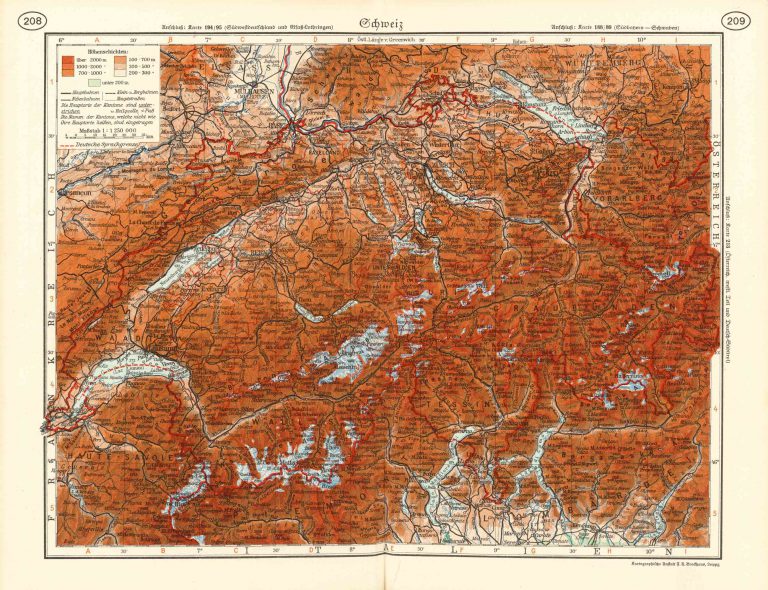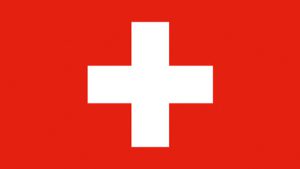
Switzerland
Policy on Immigration and Refugees
The German-speaking cantons of Switzerland are an obvious destination for Germans fleeing persecution by the Nazi regime. In 1933, nearly 10,000 refugees arrive, including 7,631 Jews who come via Basel between March and May alone.
Under a national decree dated March 31, 1933, Switzerland defines two separate categories of refugees. “Political refugees” have been eligible for asylum since the 19th century, when liberals from the autocratically ruled German principalities escaped to the democratic cantons of Switzerland. The classification is determined by the federal public attorney’s office, which is also in charge of countering any revolutionary efforts. Because most refugees classified as political belong to left-wing parties, only 650 are granted asylum from 1933 to 1945.
Victims of persecution due to “racial ideology,” on the other hand, are classified as “émigrés.” In the eyes of the antisemitic segments of society, which have been mushrooming partly in response to the Great Depression and high unemployment, these newcomers are even seen as “undesirables.” Foreigners are under the authority of the Swiss aliens’ police, which was formed after World War I in response to fears of “foreign infiltration.” As “refugees in transit,” the “émigrés” only receive six-month temporary residency permits without work authorization or state support. Although the cantons themselves initially decide on residency permits, they may only do so with the authorization of the aliens’ police from 1934 onwards. In late 1933, there are only 2,500 refugees in Switzerland; in the years that follow, the number never rises beyond 5,000.
With the mass exodus of Jews from Austria, the number doubles by late 1938 to ten or twelve thousand, even though Switzerland has introduced a visa requirement for Austrian passport holders taking effect on April 1, 1938. The aliens’ police responds to the introduction of “Reich German” identification in Austria by closing the borders to Jewish refugees. This measure is ineffectual, however. As a result, Switzerland begins requiring a visa for Germans whose passports bear a red “J” stamp. That makes it impossible for Jewish refugees to enter the country.
Cantons like Basel-Stadt and Sankt Gallen maintain their more liberal refugee policies, and individual consulate officials continue to issue generous entry visas. In the spring of 1939, however, the latter are removed from office and disciplined, as is Sankt Gallen Police Captain Paul Grüninger, who had helped more than 1,000 Jewish refugees to enter Switzerland.
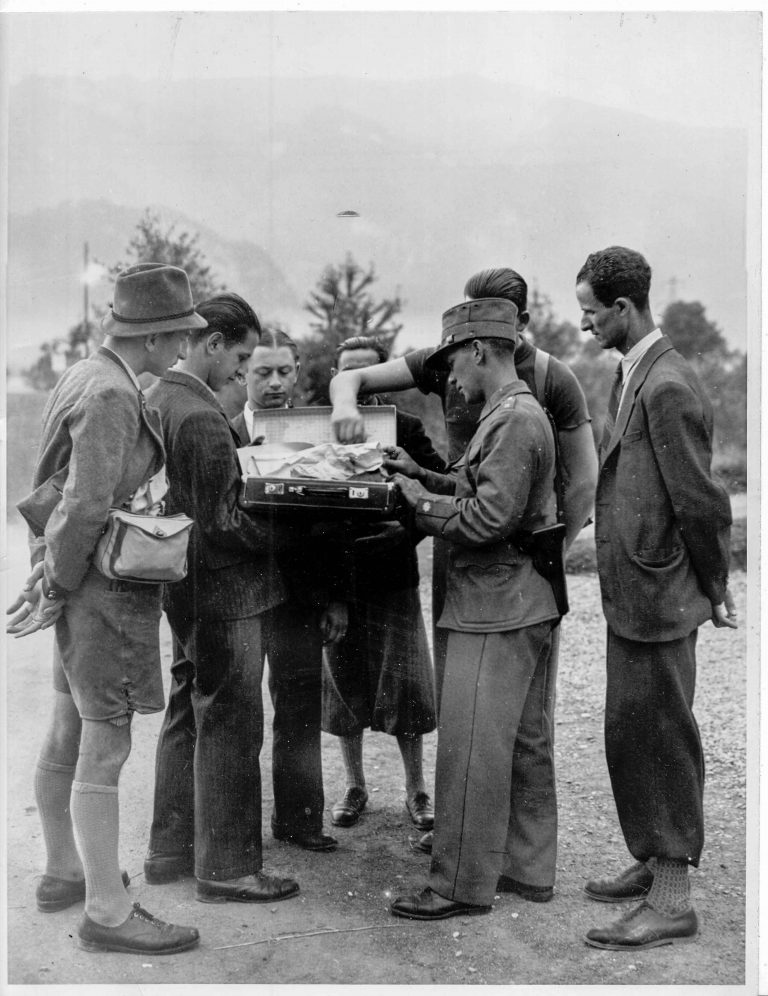
Control of Jewish refugees from Austria by Swiss customs officials at Diepoldsau, August 1938
The New York Times, Paris Office / National Archives at College Park, MD
Control of Jewish refugees from Austria by Swiss customs officials at Diepoldsau, August 1938
The New York Times, Paris Office / National Archives at College Park, MD
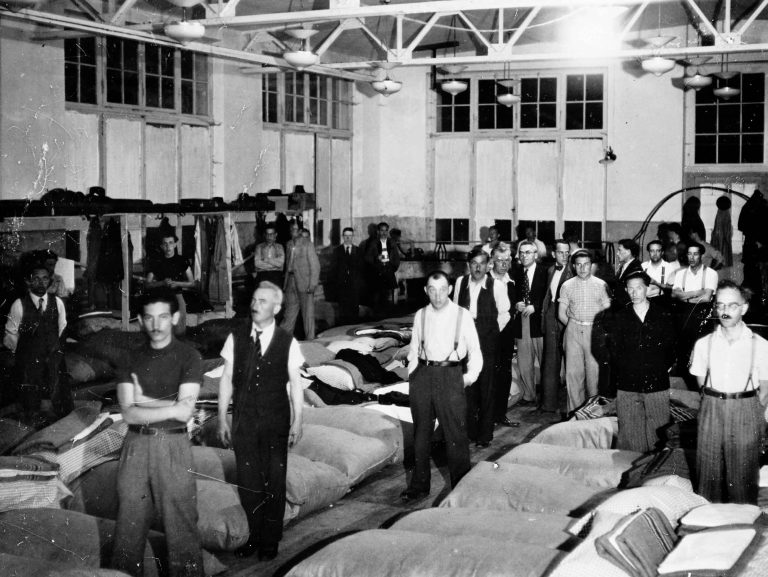
Jewish refugees at the Diepoldsau refugee camp, St. Gallen, August 20, 1938
Swiss Jewish organizations, besides operating the Diepoldsau refugee camp, are required to provide for the refugees’ accommodations and living expenses and to finance their onward travel. Because Jews have never comprised more than 0.5% of the Swiss population, the organizations are wildly overwhelmed by the responsibility. Beginning in 1939, the American Jewish Joint Distribution Committee covers more than half the costs for supporting Jewish refugees in Switzerland.
The New York Times, Paris Office / National Archives, College Park, MD
Jewish refugees at the Diepoldsau refugee camp, St. Gallen, August 20, 1938
Swiss Jewish organizations, besides operating the Diepoldsau refugee camp, are required to provide for the refugees’ accommodations and living expenses and to finance their onward travel. Because Jews have never comprised more than 0.5% of the Swiss population, the organizations are wildly overwhelmed by the responsibility. Beginning in 1939, the American Jewish Joint Distribution Committee covers more than half the costs for supporting Jewish refugees in Switzerland.
The New York Times, Paris Office / National Archives, College Park, MD
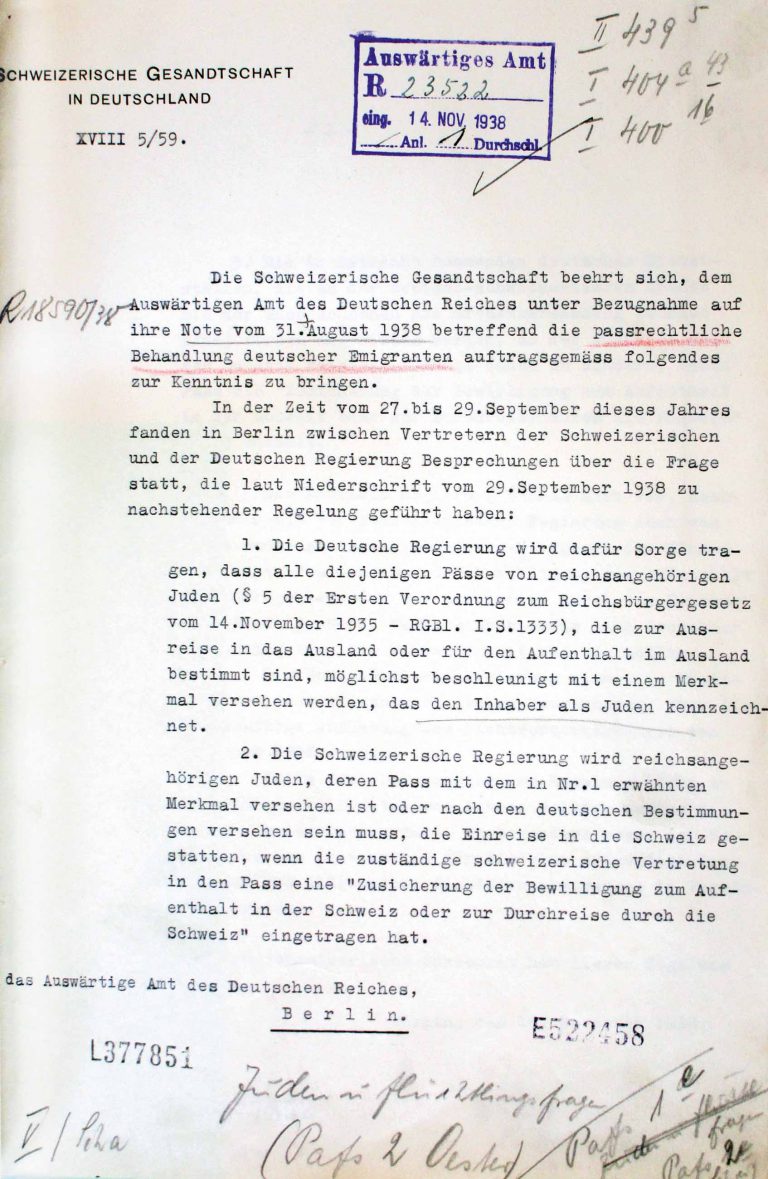
Swiss Embassy in Germany to the Foreign Office, undated (November 1938)
Switzerland decides not to introduce a general visa requirement for all Reich Germans, after Germany – during negotiations in Berlin – agrees to make the passports of its Jewish citizens identifiable. Now, holders of German passports marked with a red „J“ will be refused entry to Switzerland.
Auswärtiges Amt / Politisches Archiv, Berlin, R 49420
Swiss Embassy in Germany to the Foreign Office, undated (November 1938)
Switzerland decides not to introduce a general visa requirement for all Reich Germans, after Germany – during negotiations in Berlin – agrees to make the passports of its Jewish citizens identifiable. Now, holders of German passports marked with a red „J“ will be refused entry to Switzerland.
Auswärtiges Amt / Politisches Archiv, Berlin, R 49420
Delegation
Heinrich Rothmund
* 6 July 1888 Uster † 8 April 1961 Bern
After studying law in Zürich, Bern, and Leipzig, Heinrich Rothmund becomes director of the aliens’ police central office in 1919. In 1929, he is promoted to chief of the police division of the newly established Department of Justice and Police, into which the aliens’ police merges in 1933. He holds this post until his 1954 retirement, apart from one gap from 1945 to 1947.
Later, he is inaccurately assigned sole blame for Switzerland’s restrictive interwar and wartime refugee policies and especially vilified as the inventor of the “J” stamp. Rothmund did indeed decry Switzerland’s “foreign infiltration” and advocate a Swiss brand of antisemitism, which he explained to his Gestapo and SS hosts on a visit to Berlin. However, his refugee policy was fully in keeping with the wishes of the director of the Swiss Department of Justice and Police and the Swiss Federal Council.
Rothmund only begins participating in the Évian Conference on July 11, 1938 upon deciding that the German government is not being criticized there as the cause of the refugee crisis.
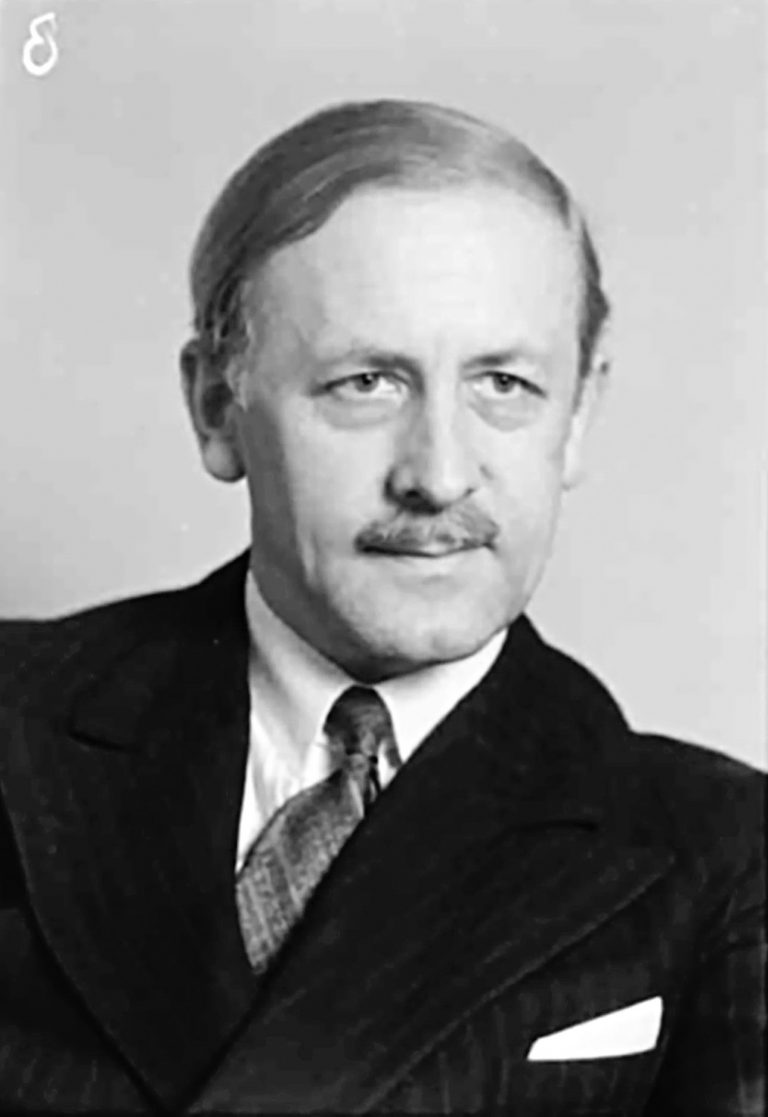
Heinrich Rothmund, 1934
Staatsarchiv des Kantons Bern, FN Jost N 4516
Heinrich Rothmund, 1934
Staatsarchiv des Kantons Bern, FN Jost N 4516
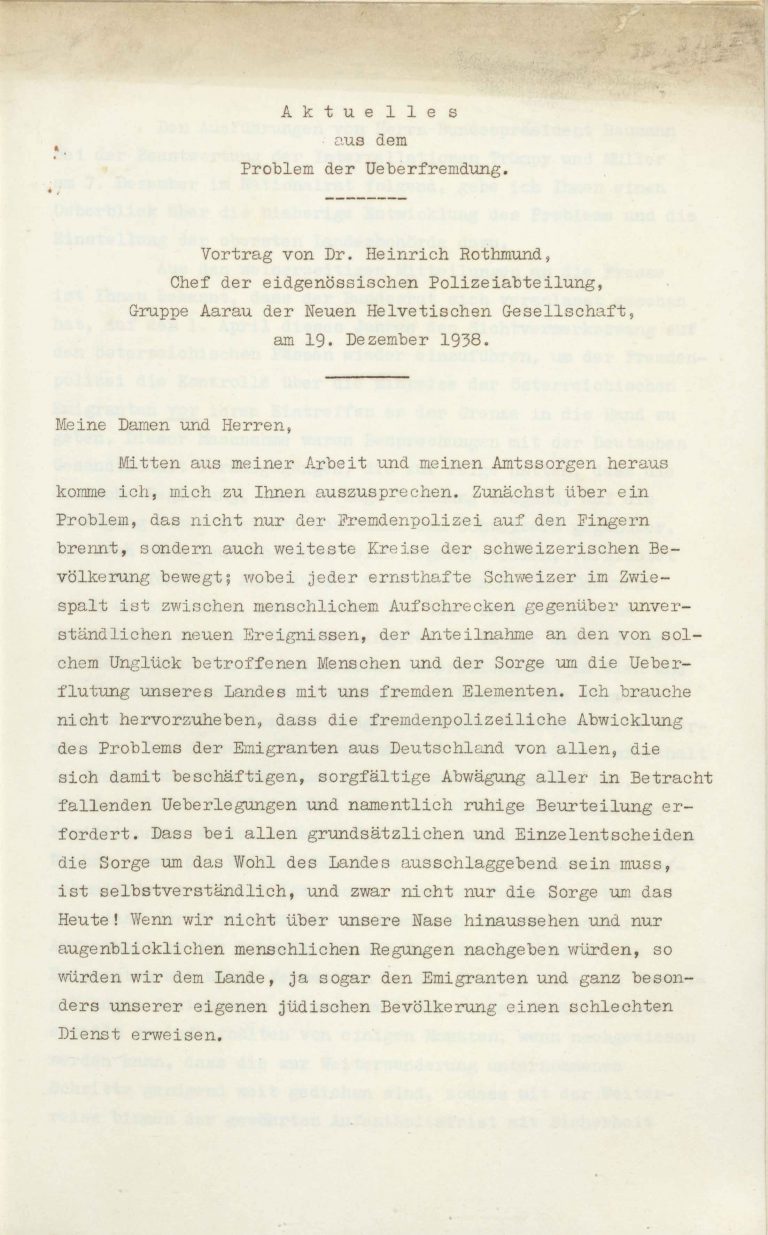
Heinrich Rothmund, “New Aspects to the Foreign Infiltration Problem,” manuscript for a lecture to the Aarau group of the New Helvetica Society on December 19, 1938, p. 1/21
At a gathering of the New Helvetica Society, which is closely allied with the New Front, a group of intellectuals advocating a political renewal of Switzerland along fascist lines, Rothmund expresses his concerns about “our country’s inundation by elements foreign to us.”
Archiv für Zeitgeschichte / ETH Zürich
Heinrich Rothmund, “New Aspects to the Foreign Infiltration Problem,” manuscript for a lecture to the Aarau group of the New Helvetica Society on December 19, 1938, p. 1/21
At a gathering of the New Helvetica Society, which is closely allied with the New Front, a group of intellectuals advocating a political renewal of Switzerland along fascist lines, Rothmund expresses his concerns about “our country’s inundation by elements foreign to us.”
Archiv für Zeitgeschichte / ETH Zürich
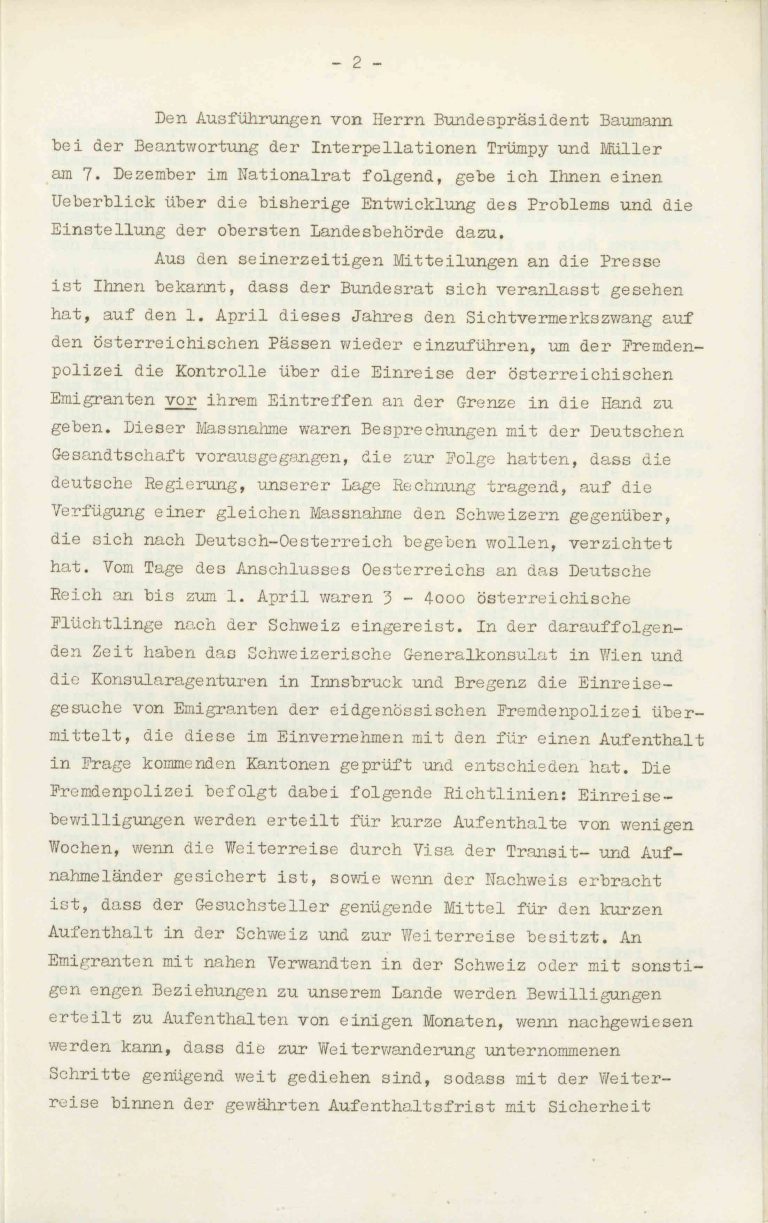
Heinrich Rothmund, “New Aspects to the Foreign Infiltration Problem,” manuscript for a lecture to the Aarau group of the New Helvetica Society on December 19, 1938, p. 2/21
At a gathering of the New Helvetica Society, which is closely allied with the New Front, a group of intellectuals advocating a political renewal of Switzerland along fascist lines, Rothmund expresses his concerns about “our country’s inundation by elements foreign to us.”
Archiv für Zeitgeschichte / ETH Zürich
Heinrich Rothmund, “New Aspects to the Foreign Infiltration Problem,” manuscript for a lecture to the Aarau group of the New Helvetica Society on December 19, 1938, p. 2/21
At a gathering of the New Helvetica Society, which is closely allied with the New Front, a group of intellectuals advocating a political renewal of Switzerland along fascist lines, Rothmund expresses his concerns about “our country’s inundation by elements foreign to us.”
Archiv für Zeitgeschichte / ETH Zürich
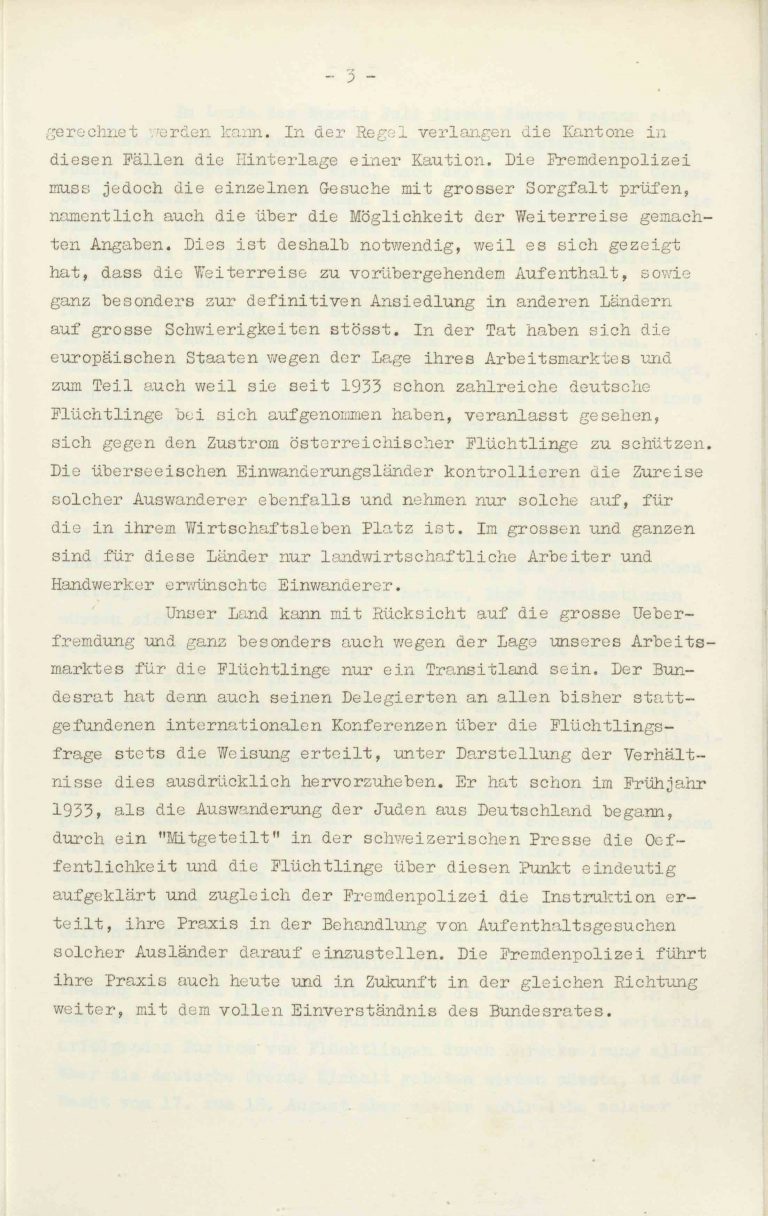
Heinrich Rothmund, “New Aspects to the Foreign Infiltration Problem,” manuscript for a lecture to the Aarau group of the New Helvetica Society on December 19, 1938, p. 3/21
At a gathering of the New Helvetica Society, which is closely allied with the New Front, a group of intellectuals advocating a political renewal of Switzerland along fascist lines, Rothmund expresses his concerns about “our country’s inundation by elements foreign to us.”
Archiv für Zeitgeschichte / ETH Zürich
Heinrich Rothmund, “New Aspects to the Foreign Infiltration Problem,” manuscript for a lecture to the Aarau group of the New Helvetica Society on December 19, 1938, p. 3/21
At a gathering of the New Helvetica Society, which is closely allied with the New Front, a group of intellectuals advocating a political renewal of Switzerland along fascist lines, Rothmund expresses his concerns about “our country’s inundation by elements foreign to us.”
Archiv für Zeitgeschichte / ETH Zürich
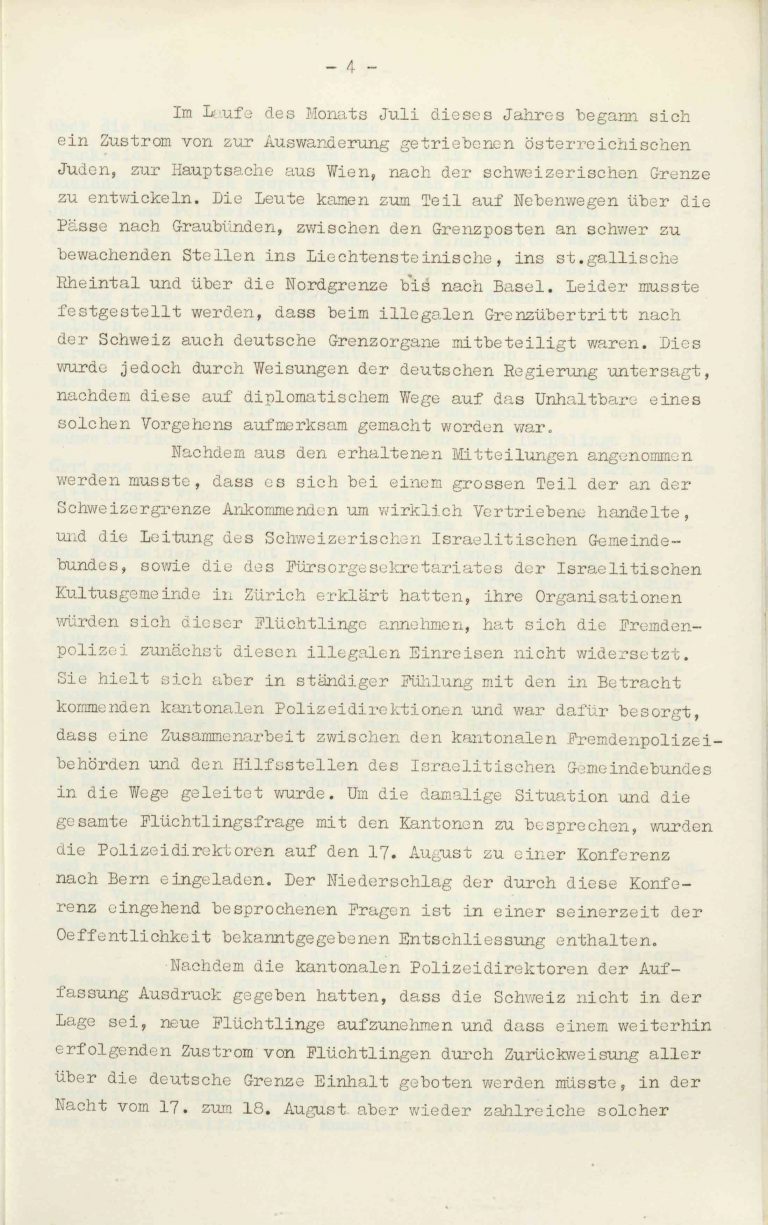
Heinrich Rothmund, “New Aspects to the Foreign Infiltration Problem,” manuscript for a lecture to the Aarau group of the New Helvetica Society on December 19, 1938, p. 4/21
At a gathering of the New Helvetica Society, which is closely allied with the New Front, a group of intellectuals advocating a political renewal of Switzerland along fascist lines, Rothmund expresses his concerns about “our country’s inundation by elements foreign to us.”
Archiv für Zeitgeschichte / ETH Zürich
Heinrich Rothmund, “New Aspects to the Foreign Infiltration Problem,” manuscript for a lecture to the Aarau group of the New Helvetica Society on December 19, 1938, p. 4/21
At a gathering of the New Helvetica Society, which is closely allied with the New Front, a group of intellectuals advocating a political renewal of Switzerland along fascist lines, Rothmund expresses his concerns about “our country’s inundation by elements foreign to us.”
Archiv für Zeitgeschichte / ETH Zürich
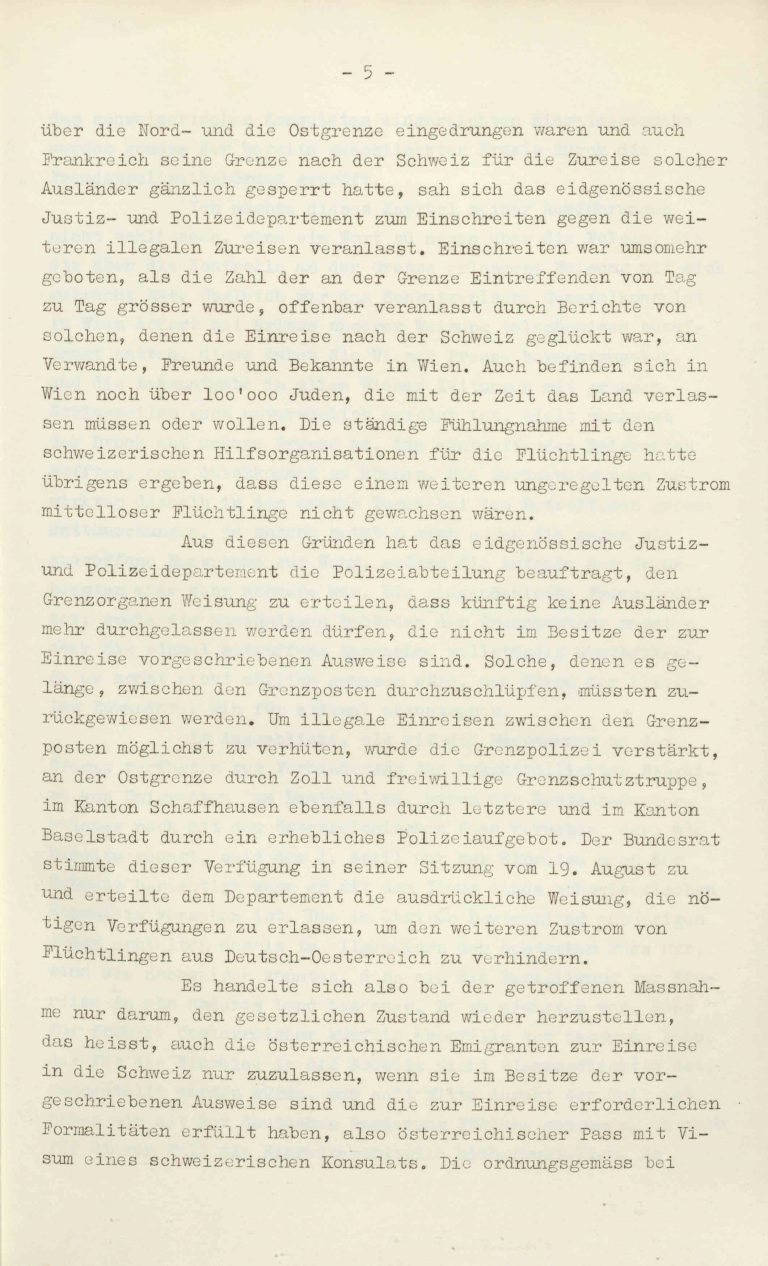
Heinrich Rothmund, “New Aspects to the Foreign Infiltration Problem,” manuscript for a lecture to the Aarau group of the New Helvetica Society on December 19, 1938, p. 5/21
At a gathering of the New Helvetica Society, which is closely allied with the New Front, a group of intellectuals advocating a political renewal of Switzerland along fascist lines, Rothmund expresses his concerns about “our country’s inundation by elements foreign to us.”
Archiv für Zeitgeschichte / ETH Zürich
Heinrich Rothmund, “New Aspects to the Foreign Infiltration Problem,” manuscript for a lecture to the Aarau group of the New Helvetica Society on December 19, 1938, p. 5/21
At a gathering of the New Helvetica Society, which is closely allied with the New Front, a group of intellectuals advocating a political renewal of Switzerland along fascist lines, Rothmund expresses his concerns about “our country’s inundation by elements foreign to us.”
Archiv für Zeitgeschichte / ETH Zürich
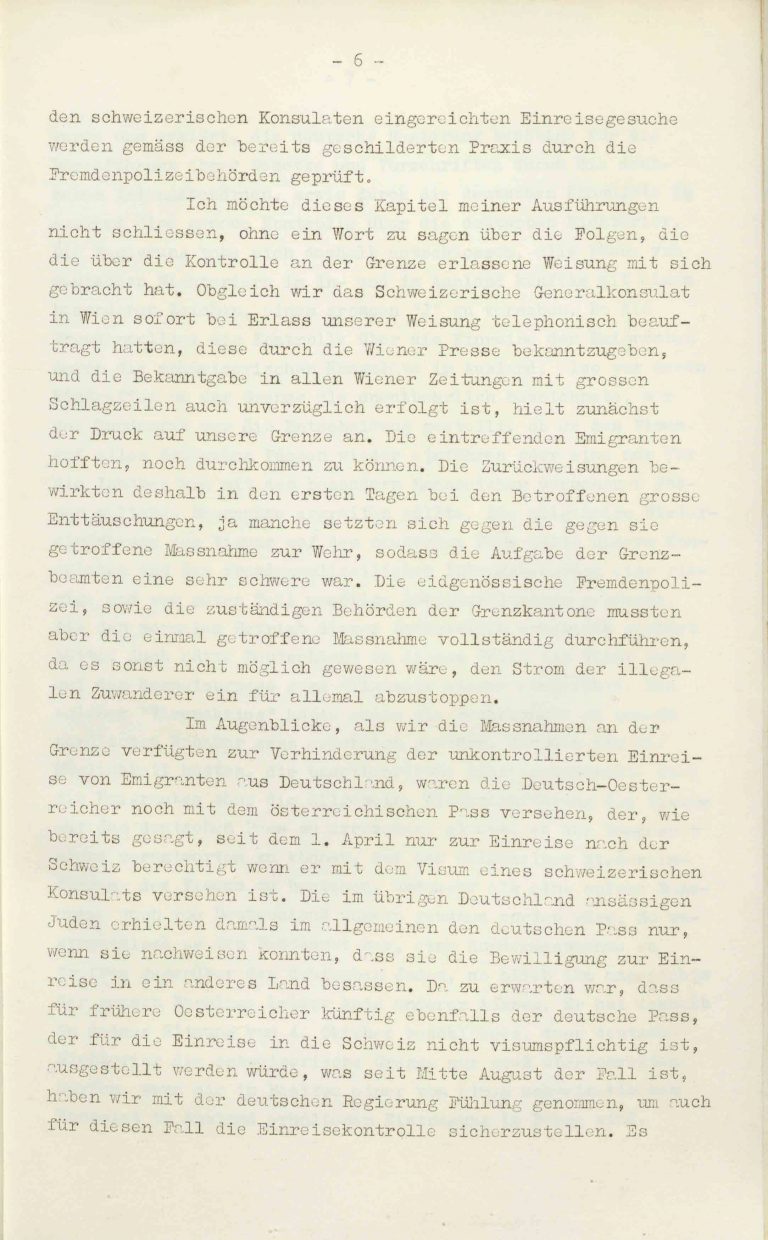
Heinrich Rothmund, “New Aspects to the Foreign Infiltration Problem,” manuscript for a lecture to the Aarau group of the New Helvetica Society on December 19, 1938, p. 6/21
At a gathering of the New Helvetica Society, which is closely allied with the New Front, a group of intellectuals advocating a political renewal of Switzerland along fascist lines, Rothmund expresses his concerns about “our country’s inundation by elements foreign to us.”
Archiv für Zeitgeschichte / ETH Zürich
Heinrich Rothmund, “New Aspects to the Foreign Infiltration Problem,” manuscript for a lecture to the Aarau group of the New Helvetica Society on December 19, 1938, p. 6/21
At a gathering of the New Helvetica Society, which is closely allied with the New Front, a group of intellectuals advocating a political renewal of Switzerland along fascist lines, Rothmund expresses his concerns about “our country’s inundation by elements foreign to us.”
Archiv für Zeitgeschichte / ETH Zürich
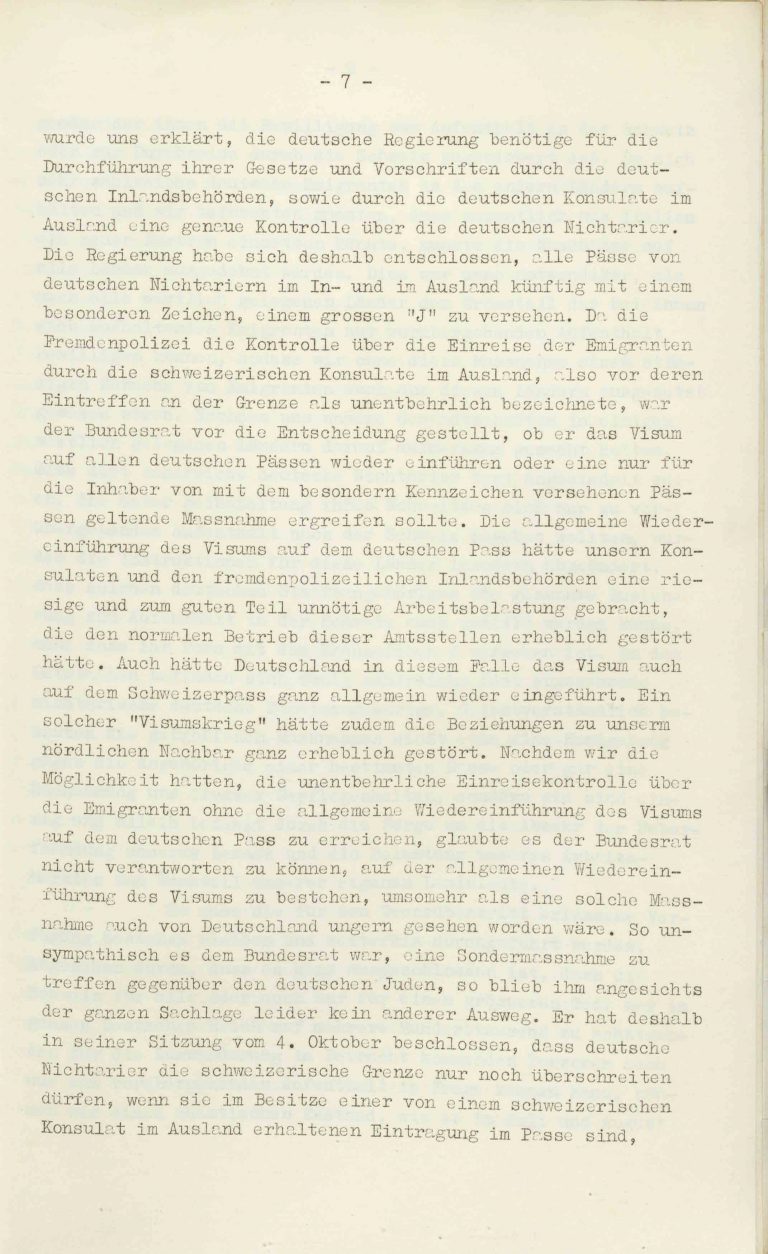
Heinrich Rothmund, “New Aspects to the Foreign Infiltration Problem,” manuscript for a lecture to the Aarau group of the New Helvetica Society on December 19, 1938, p. 7/21
At a gathering of the New Helvetica Society, which is closely allied with the New Front, a group of intellectuals advocating a political renewal of Switzerland along fascist lines, Rothmund expresses his concerns about “our country’s inundation by elements foreign to us.”
Archiv für Zeitgeschichte / ETH Zürich
Heinrich Rothmund, “New Aspects to the Foreign Infiltration Problem,” manuscript for a lecture to the Aarau group of the New Helvetica Society on December 19, 1938, p. 7/21
At a gathering of the New Helvetica Society, which is closely allied with the New Front, a group of intellectuals advocating a political renewal of Switzerland along fascist lines, Rothmund expresses his concerns about “our country’s inundation by elements foreign to us.”
Archiv für Zeitgeschichte / ETH Zürich
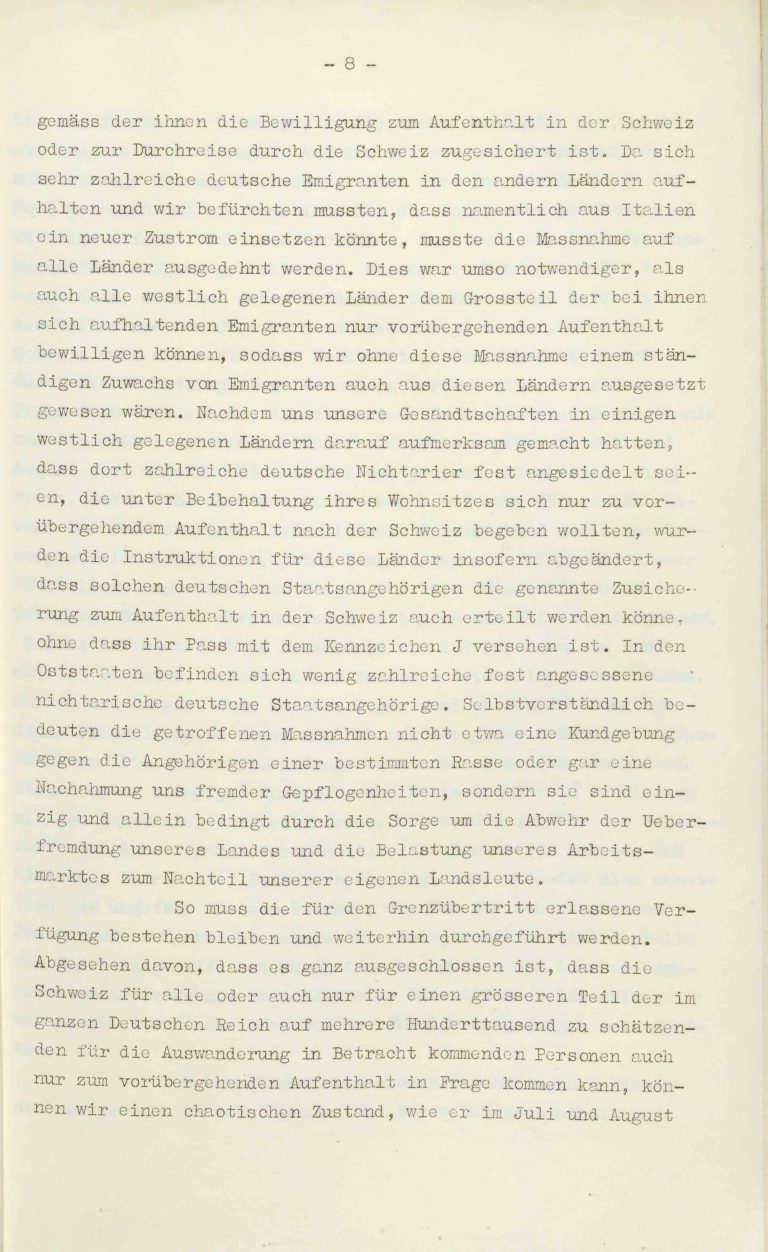
Heinrich Rothmund, “New Aspects to the Foreign Infiltration Problem,” manuscript for a lecture to the Aarau group of the New Helvetica Society on December 19, 1938, p. 8/21
At a gathering of the New Helvetica Society, which is closely allied with the New Front, a group of intellectuals advocating a political renewal of Switzerland along fascist lines, Rothmund expresses his concerns about “our country’s inundation by elements foreign to us.”
Archiv für Zeitgeschichte / ETH Zürich
Heinrich Rothmund, “New Aspects to the Foreign Infiltration Problem,” manuscript for a lecture to the Aarau group of the New Helvetica Society on December 19, 1938, p. 8/21
At a gathering of the New Helvetica Society, which is closely allied with the New Front, a group of intellectuals advocating a political renewal of Switzerland along fascist lines, Rothmund expresses his concerns about “our country’s inundation by elements foreign to us.”
Archiv für Zeitgeschichte / ETH Zürich
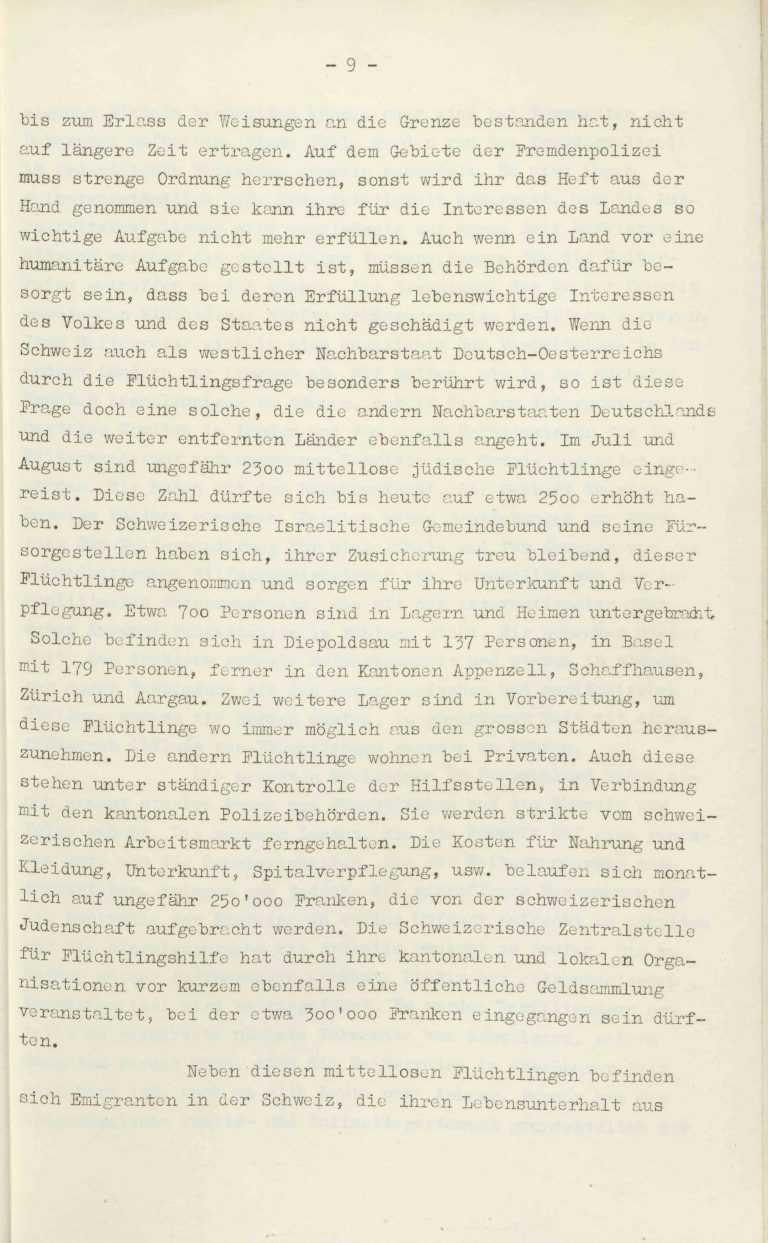
Heinrich Rothmund, “New Aspects to the Foreign Infiltration Problem,” manuscript for a lecture to the Aarau group of the New Helvetica Society on December 19, 1938, p. 9/21
At a gathering of the New Helvetica Society, which is closely allied with the New Front, a group of intellectuals advocating a political renewal of Switzerland along fascist lines, Rothmund expresses his concerns about “our country’s inundation by elements foreign to us.”
Archiv für Zeitgeschichte / ETH Zürich
Heinrich Rothmund, “New Aspects to the Foreign Infiltration Problem,” manuscript for a lecture to the Aarau group of the New Helvetica Society on December 19, 1938, p. 9/21
At a gathering of the New Helvetica Society, which is closely allied with the New Front, a group of intellectuals advocating a political renewal of Switzerland along fascist lines, Rothmund expresses his concerns about “our country’s inundation by elements foreign to us.”
Archiv für Zeitgeschichte / ETH Zürich
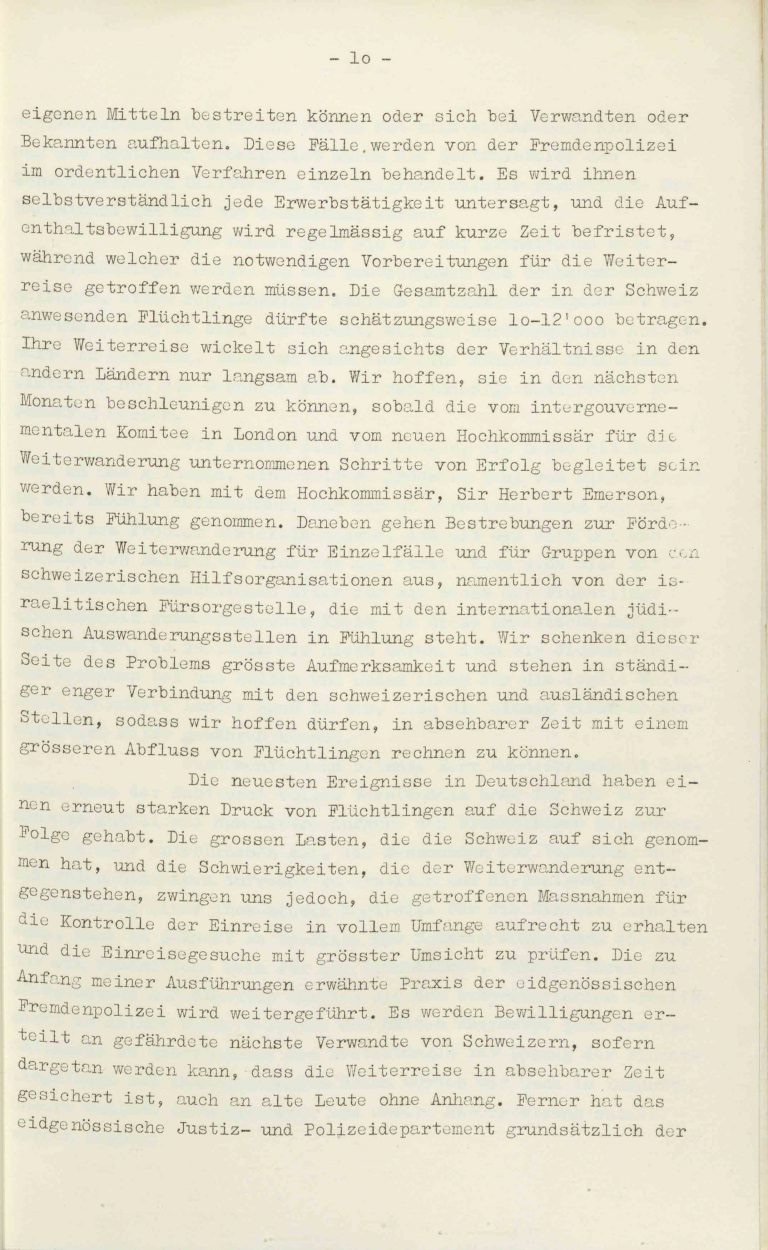
Heinrich Rothmund, “New Aspects to the Foreign Infiltration Problem,” manuscript for a lecture to the Aarau group of the New Helvetica Society on December 19, 1938, p. 10/21
At a gathering of the New Helvetica Society, which is closely allied with the New Front, a group of intellectuals advocating a political renewal of Switzerland along fascist lines, Rothmund expresses his concerns about “our country’s inundation by elements foreign to us.”
Archiv für Zeitgeschichte / ETH Zürich
Heinrich Rothmund, “New Aspects to the Foreign Infiltration Problem,” manuscript for a lecture to the Aarau group of the New Helvetica Society on December 19, 1938, p. 10/21
At a gathering of the New Helvetica Society, which is closely allied with the New Front, a group of intellectuals advocating a political renewal of Switzerland along fascist lines, Rothmund expresses his concerns about “our country’s inundation by elements foreign to us.”
Archiv für Zeitgeschichte / ETH Zürich
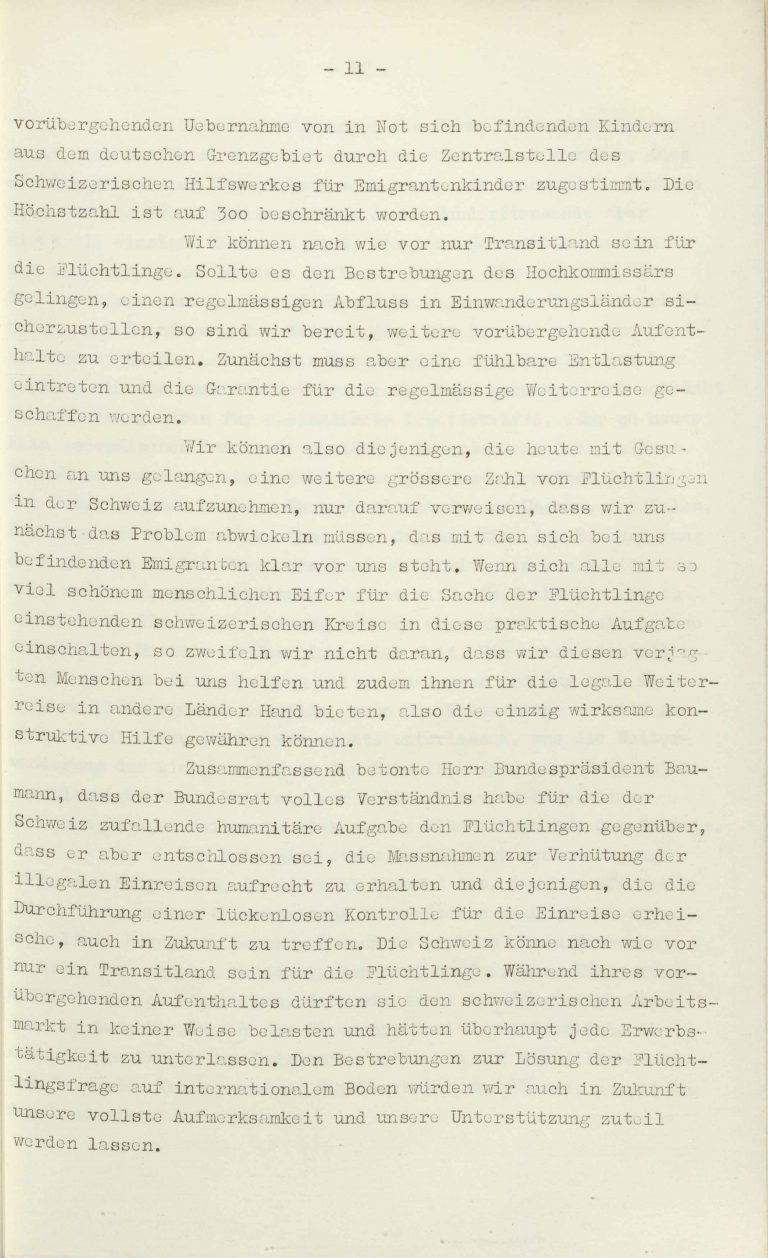
Heinrich Rothmund, “New Aspects to the Foreign Infiltration Problem,” manuscript for a lecture to the Aarau group of the New Helvetica Society on December 19, 1938, p. 11/21
At a gathering of the New Helvetica Society, which is closely allied with the New Front, a group of intellectuals advocating a political renewal of Switzerland along fascist lines, Rothmund expresses his concerns about “our country’s inundation by elements foreign to us.”
Archiv für Zeitgeschichte / ETH Zürich
Heinrich Rothmund, “New Aspects to the Foreign Infiltration Problem,” manuscript for a lecture to the Aarau group of the New Helvetica Society on December 19, 1938, p. 11/21
At a gathering of the New Helvetica Society, which is closely allied with the New Front, a group of intellectuals advocating a political renewal of Switzerland along fascist lines, Rothmund expresses his concerns about “our country’s inundation by elements foreign to us.”
Archiv für Zeitgeschichte / ETH Zürich
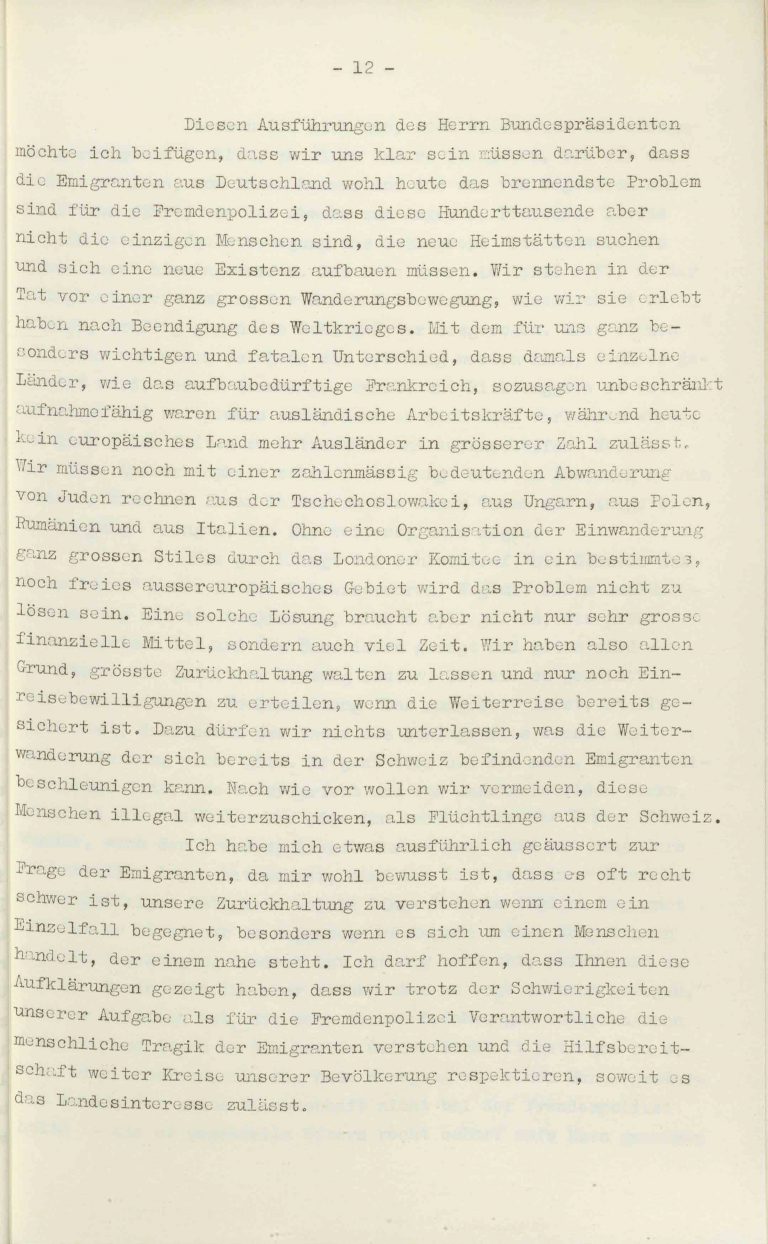
Heinrich Rothmund, “New Aspects to the Foreign Infiltration Problem,” manuscript for a lecture to the Aarau group of the New Helvetica Society on December 19, 1938, p. 12/21
At a gathering of the New Helvetica Society, which is closely allied with the New Front, a group of intellectuals advocating a political renewal of Switzerland along fascist lines, Rothmund expresses his concerns about “our country’s inundation by elements foreign to us.”
Archiv für Zeitgeschichte / ETH Zürich
Heinrich Rothmund, “New Aspects to the Foreign Infiltration Problem,” manuscript for a lecture to the Aarau group of the New Helvetica Society on December 19, 1938, p. 12/21
At a gathering of the New Helvetica Society, which is closely allied with the New Front, a group of intellectuals advocating a political renewal of Switzerland along fascist lines, Rothmund expresses his concerns about “our country’s inundation by elements foreign to us.”
Archiv für Zeitgeschichte / ETH Zürich
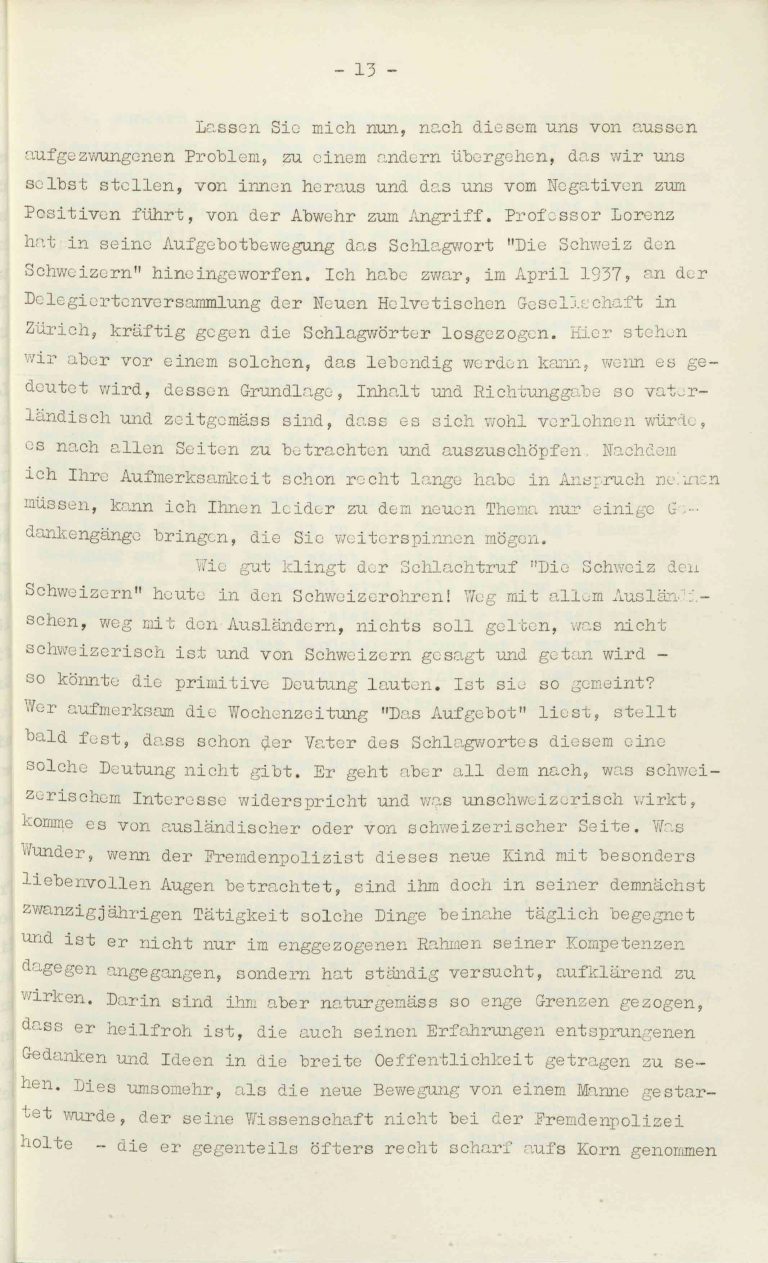
Heinrich Rothmund, “New Aspects to the Foreign Infiltration Problem,” manuscript for a lecture to the Aarau group of the New Helvetica Society on December 19, 1938, p. 13/21
At a gathering of the New Helvetica Society, which is closely allied with the New Front, a group of intellectuals advocating a political renewal of Switzerland along fascist lines, Rothmund expresses his concerns about “our country’s inundation by elements foreign to us.”
Archiv für Zeitgeschichte / ETH Zürich
Heinrich Rothmund, “New Aspects to the Foreign Infiltration Problem,” manuscript for a lecture to the Aarau group of the New Helvetica Society on December 19, 1938, p. 13/21
At a gathering of the New Helvetica Society, which is closely allied with the New Front, a group of intellectuals advocating a political renewal of Switzerland along fascist lines, Rothmund expresses his concerns about “our country’s inundation by elements foreign to us.”
Archiv für Zeitgeschichte / ETH Zürich
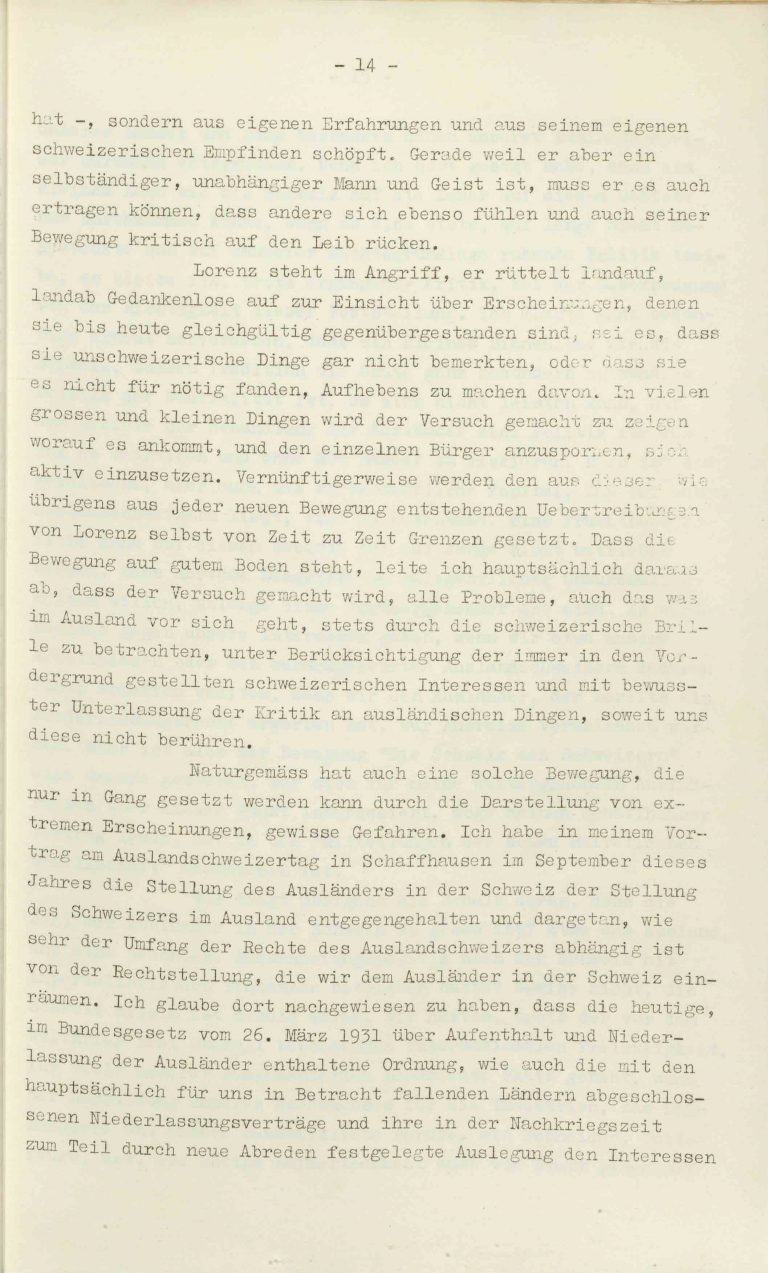
Heinrich Rothmund, “New Aspects to the Foreign Infiltration Problem,” manuscript for a lecture to the Aarau group of the New Helvetica Society on December 19, 1938, p. 14/21
At a gathering of the New Helvetica Society, which is closely allied with the New Front, a group of intellectuals advocating a political renewal of Switzerland along fascist lines, Rothmund expresses his concerns about “our country’s inundation by elements foreign to us.”
Archiv für Zeitgeschichte / ETH Zürich
Heinrich Rothmund, “New Aspects to the Foreign Infiltration Problem,” manuscript for a lecture to the Aarau group of the New Helvetica Society on December 19, 1938, p. 14/21
At a gathering of the New Helvetica Society, which is closely allied with the New Front, a group of intellectuals advocating a political renewal of Switzerland along fascist lines, Rothmund expresses his concerns about “our country’s inundation by elements foreign to us.”
Archiv für Zeitgeschichte / ETH Zürich
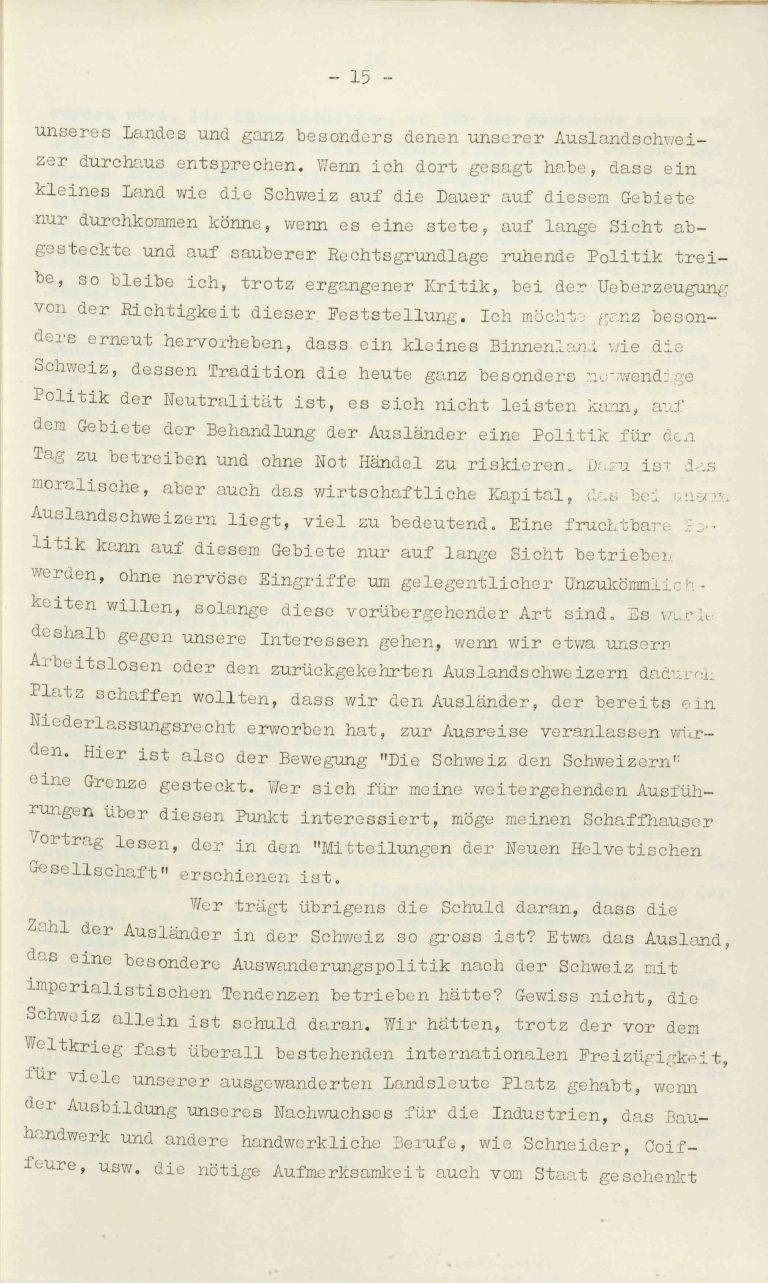
Heinrich Rothmund, “New Aspects to the Foreign Infiltration Problem,” manuscript for a lecture to the Aarau group of the New Helvetica Society on December 19, 1938, p. 15/21
At a gathering of the New Helvetica Society, which is closely allied with the New Front, a group of intellectuals advocating a political renewal of Switzerland along fascist lines, Rothmund expresses his concerns about “our country’s inundation by elements foreign to us.”
Archiv für Zeitgeschichte / ETH Zürich
Heinrich Rothmund, “New Aspects to the Foreign Infiltration Problem,” manuscript for a lecture to the Aarau group of the New Helvetica Society on December 19, 1938, p. 15/21
At a gathering of the New Helvetica Society, which is closely allied with the New Front, a group of intellectuals advocating a political renewal of Switzerland along fascist lines, Rothmund expresses his concerns about “our country’s inundation by elements foreign to us.”
Archiv für Zeitgeschichte / ETH Zürich
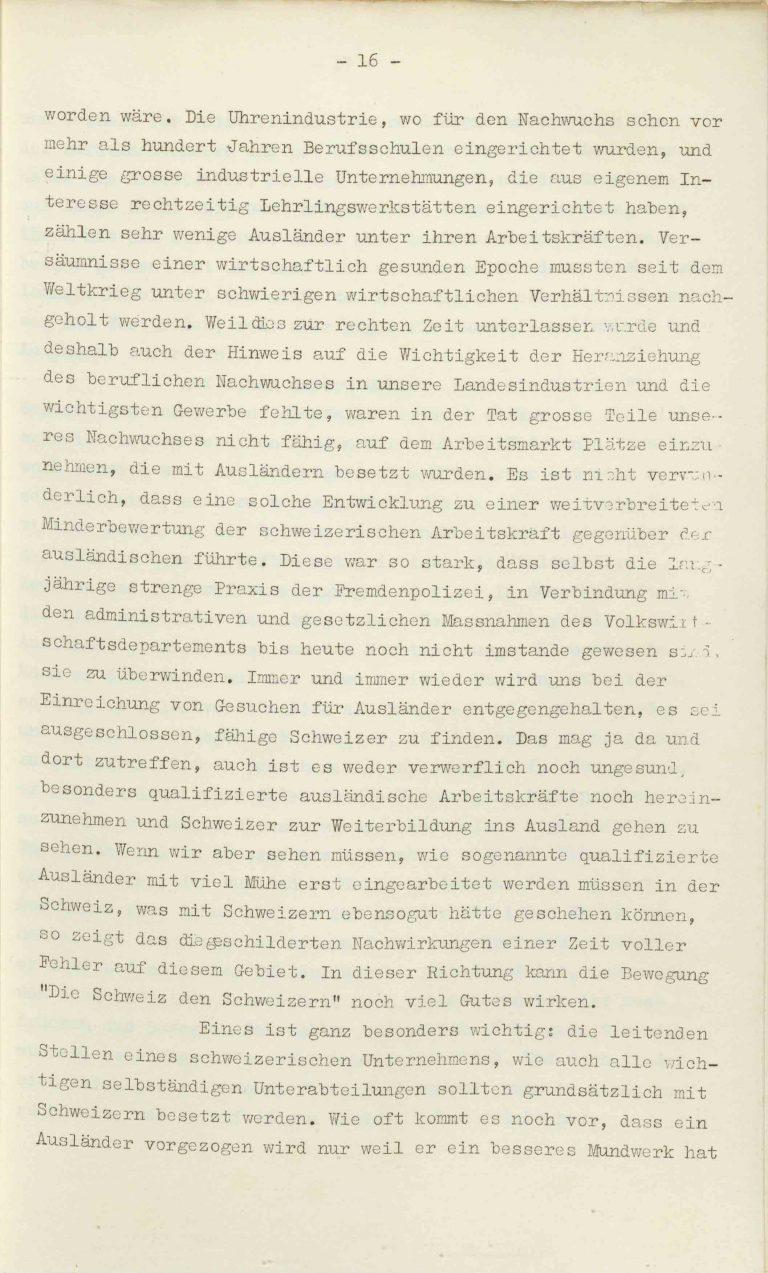
Heinrich Rothmund, “New Aspects to the Foreign Infiltration Problem,” manuscript for a lecture to the Aarau group of the New Helvetica Society on December 19, 1938, p. 16/21
At a gathering of the New Helvetica Society, which is closely allied with the New Front, a group of intellectuals advocating a political renewal of Switzerland along fascist lines, Rothmund expresses his concerns about “our country’s inundation by elements foreign to us.”
Archiv für Zeitgeschichte / ETH Zürich
Heinrich Rothmund, “New Aspects to the Foreign Infiltration Problem,” manuscript for a lecture to the Aarau group of the New Helvetica Society on December 19, 1938, p. 16/21
At a gathering of the New Helvetica Society, which is closely allied with the New Front, a group of intellectuals advocating a political renewal of Switzerland along fascist lines, Rothmund expresses his concerns about “our country’s inundation by elements foreign to us.”
Archiv für Zeitgeschichte / ETH Zürich
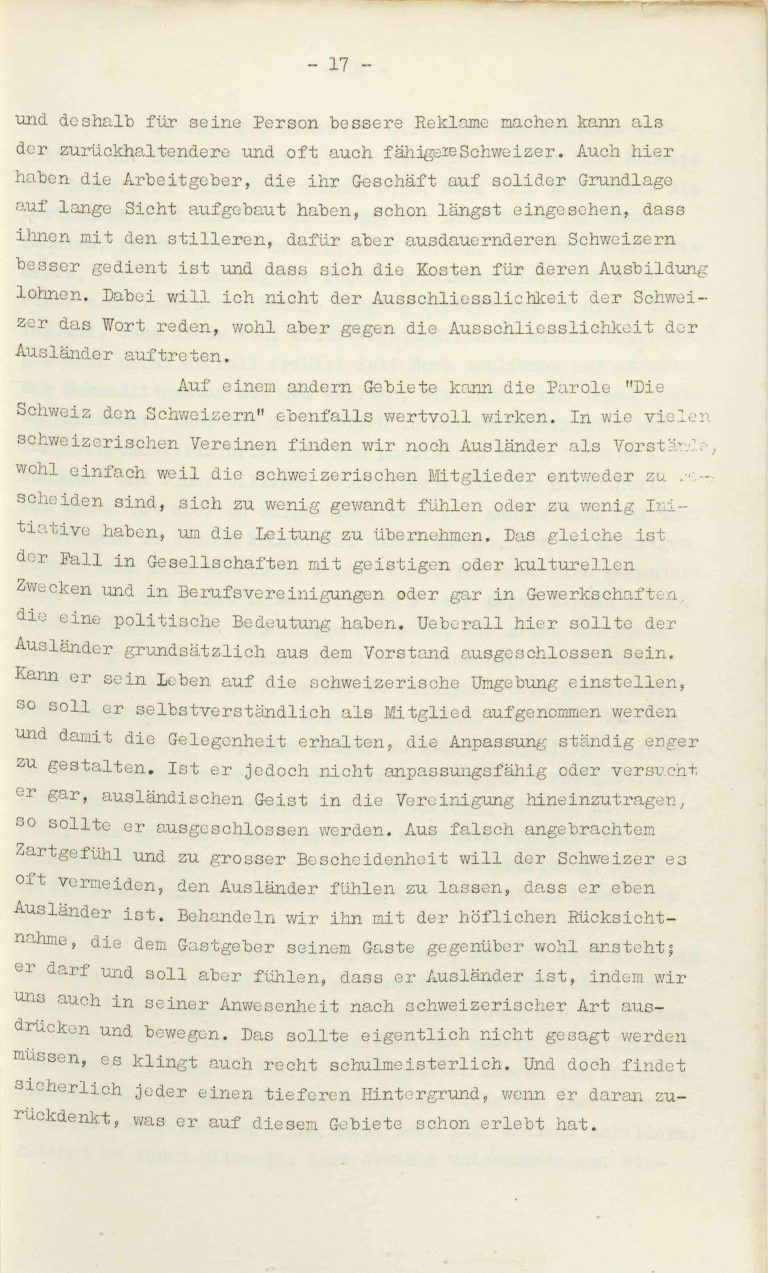
Heinrich Rothmund, “New Aspects to the Foreign Infiltration Problem,” manuscript for a lecture to the Aarau group of the New Helvetica Society on December 19, 1938, p. 17/21
At a gathering of the New Helvetica Society, which is closely allied with the New Front, a group of intellectuals advocating a political renewal of Switzerland along fascist lines, Rothmund expresses his concerns about “our country’s inundation by elements foreign to us.”
Archiv für Zeitgeschichte / ETH Zürich
Heinrich Rothmund, “New Aspects to the Foreign Infiltration Problem,” manuscript for a lecture to the Aarau group of the New Helvetica Society on December 19, 1938, p. 17/21
At a gathering of the New Helvetica Society, which is closely allied with the New Front, a group of intellectuals advocating a political renewal of Switzerland along fascist lines, Rothmund expresses his concerns about “our country’s inundation by elements foreign to us.”
Archiv für Zeitgeschichte / ETH Zürich
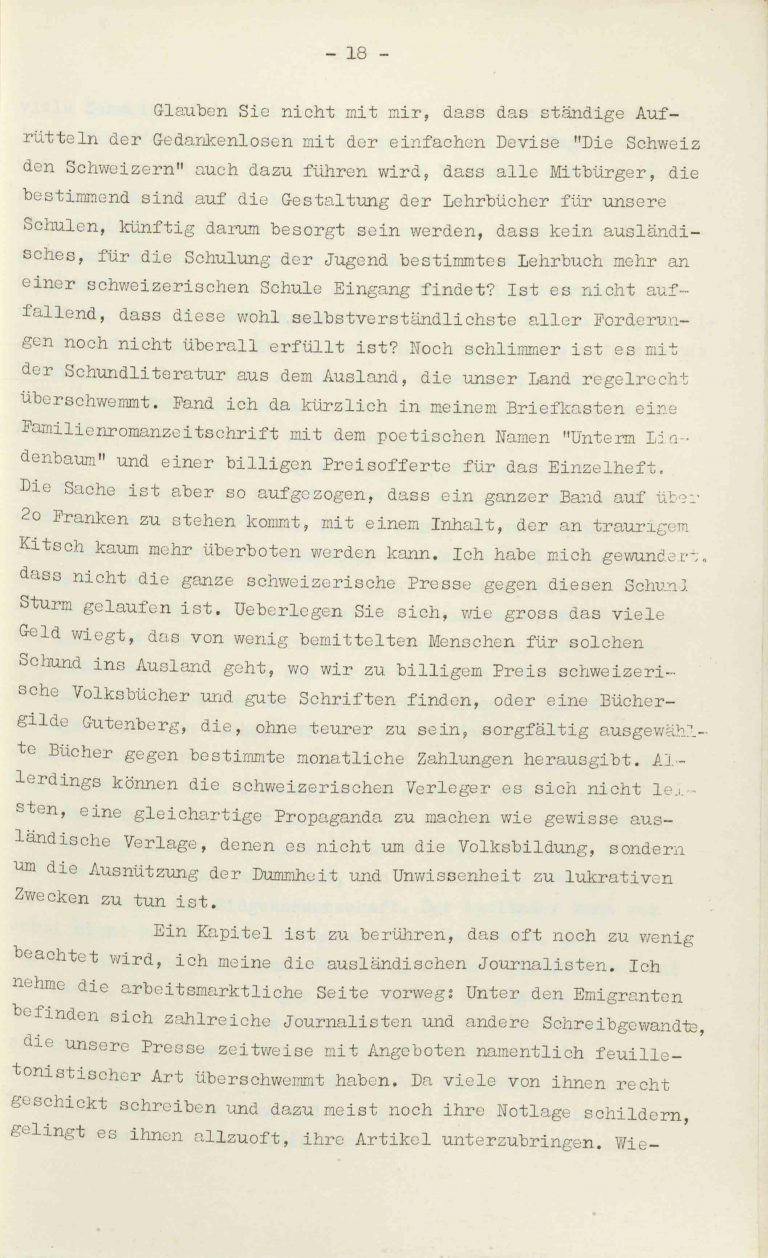
Heinrich Rothmund, “New Aspects to the Foreign Infiltration Problem,” manuscript for a lecture to the Aarau group of the New Helvetica Society on December 19, 1938, p. 18/21
At a gathering of the New Helvetica Society, which is closely allied with the New Front, a group of intellectuals advocating a political renewal of Switzerland along fascist lines, Rothmund expresses his concerns about “our country’s inundation by elements foreign to us.”
Archiv für Zeitgeschichte / ETH Zürich
Heinrich Rothmund, “New Aspects to the Foreign Infiltration Problem,” manuscript for a lecture to the Aarau group of the New Helvetica Society on December 19, 1938, p. 18/21
At a gathering of the New Helvetica Society, which is closely allied with the New Front, a group of intellectuals advocating a political renewal of Switzerland along fascist lines, Rothmund expresses his concerns about “our country’s inundation by elements foreign to us.”
Archiv für Zeitgeschichte / ETH Zürich
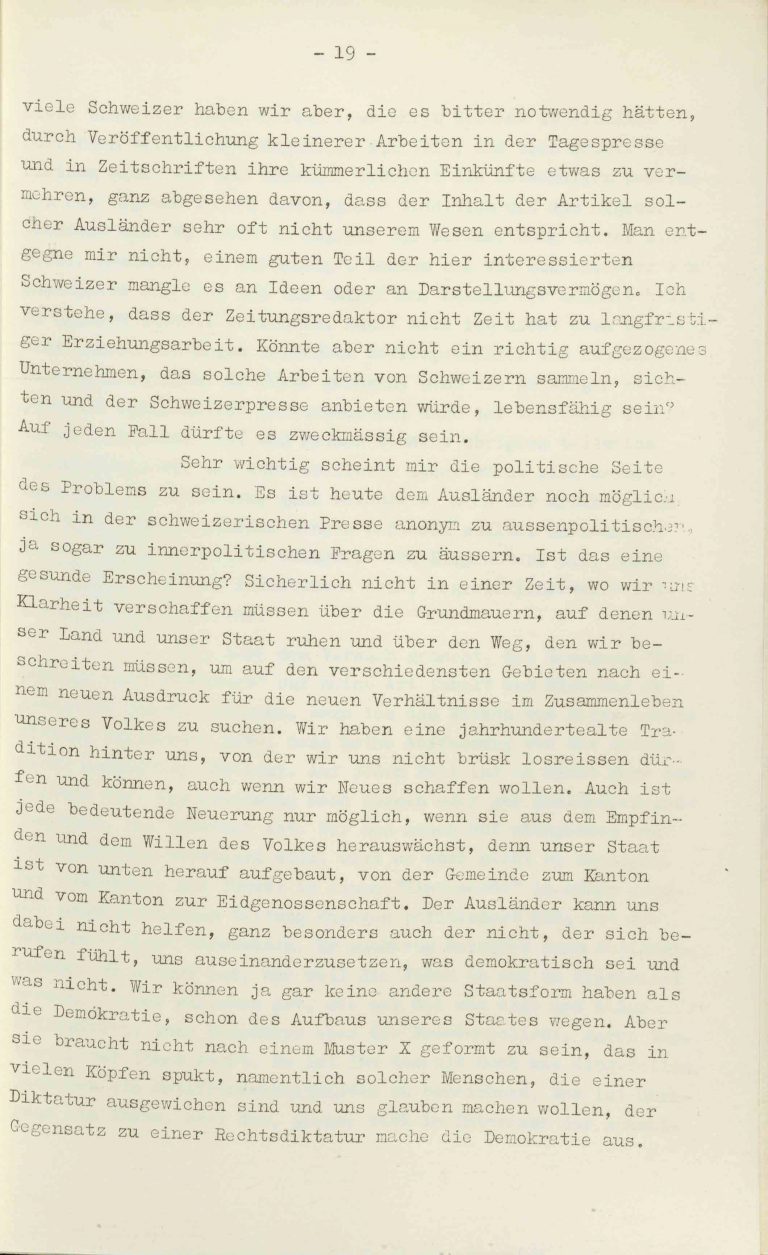
Heinrich Rothmund, “New Aspects to the Foreign Infiltration Problem,” manuscript for a lecture to the Aarau group of the New Helvetica Society on December 19, 1938, p. 19/21
At a gathering of the New Helvetica Society, which is closely allied with the New Front, a group of intellectuals advocating a political renewal of Switzerland along fascist lines, Rothmund expresses his concerns about “our country’s inundation by elements foreign to us.”
Archiv für Zeitgeschichte / ETH Zürich
Heinrich Rothmund, “New Aspects to the Foreign Infiltration Problem,” manuscript for a lecture to the Aarau group of the New Helvetica Society on December 19, 1938, p. 19/21
At a gathering of the New Helvetica Society, which is closely allied with the New Front, a group of intellectuals advocating a political renewal of Switzerland along fascist lines, Rothmund expresses his concerns about “our country’s inundation by elements foreign to us.”
Archiv für Zeitgeschichte / ETH Zürich
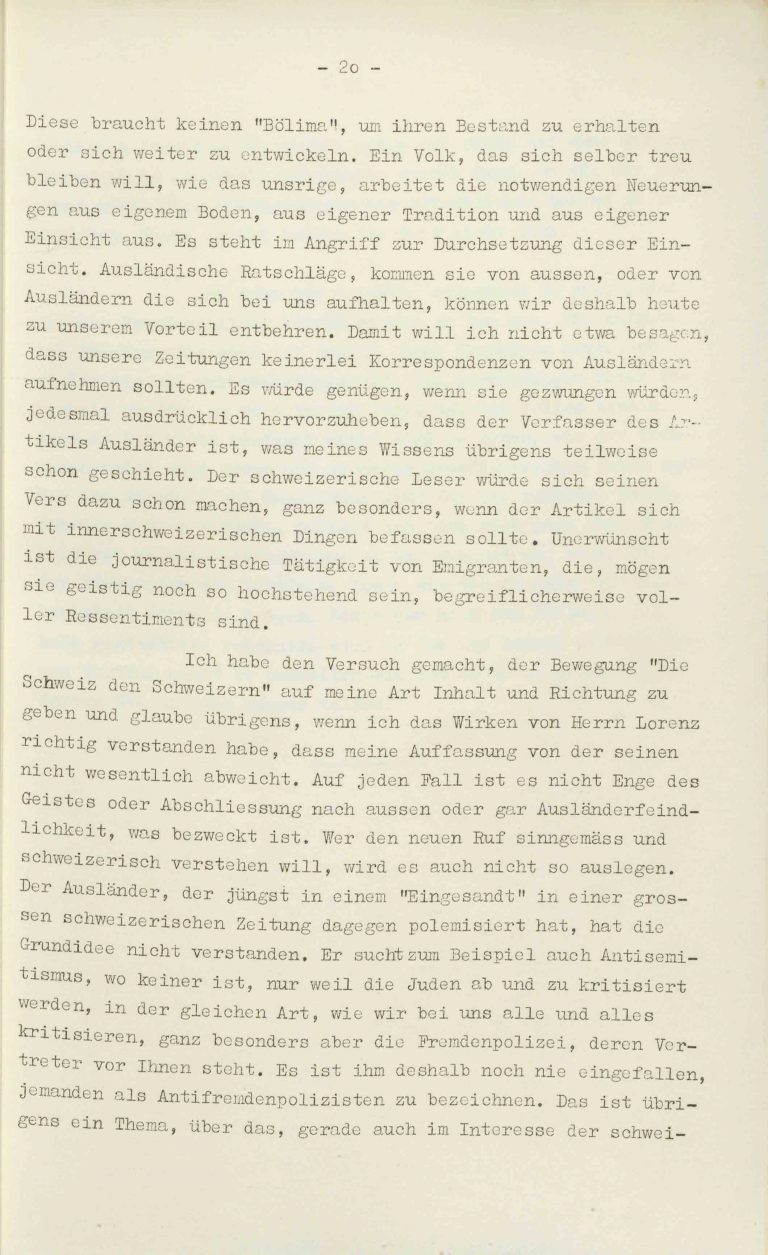
Heinrich Rothmund, “New Aspects to the Foreign Infiltration Problem,” manuscript for a lecture to the Aarau group of the New Helvetica Society on December 19, 1938, p. 20/21
At a gathering of the New Helvetica Society, which is closely allied with the New Front, a group of intellectuals advocating a political renewal of Switzerland along fascist lines, Rothmund expresses his concerns about “our country’s inundation by elements foreign to us.”
Archiv für Zeitgeschichte / ETH Zürich
Heinrich Rothmund, “New Aspects to the Foreign Infiltration Problem,” manuscript for a lecture to the Aarau group of the New Helvetica Society on December 19, 1938, p. 20/21
At a gathering of the New Helvetica Society, which is closely allied with the New Front, a group of intellectuals advocating a political renewal of Switzerland along fascist lines, Rothmund expresses his concerns about “our country’s inundation by elements foreign to us.”
Archiv für Zeitgeschichte / ETH Zürich
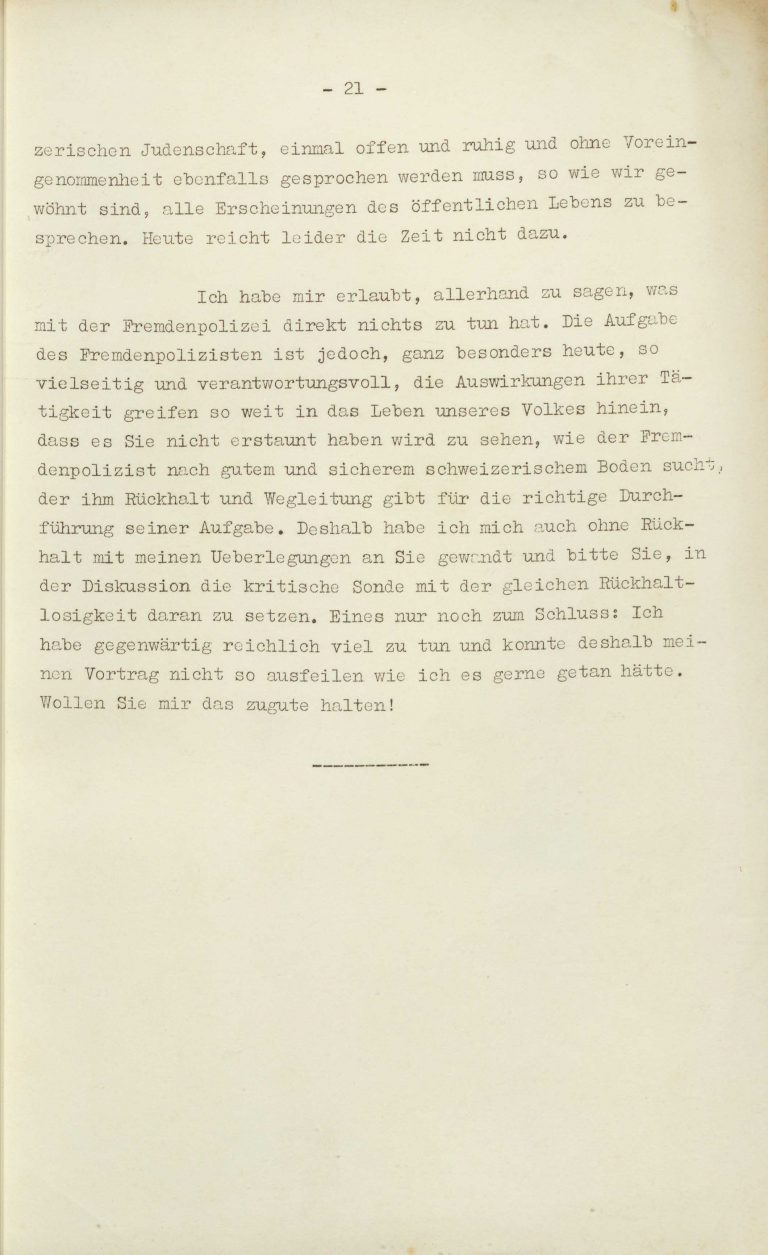
Heinrich Rothmund, “New Aspects to the Foreign Infiltration Problem,” manuscript for a lecture to the Aarau group of the New Helvetica Society on December 19, 1938, p. 21/21
At a gathering of the New Helvetica Society, which is closely allied with the New Front, a group of intellectuals advocating a political renewal of Switzerland along fascist lines, Rothmund expresses his concerns about “our country’s inundation by elements foreign to us.”
Archiv für Zeitgeschichte / ETH Zürich
Heinrich Rothmund, “New Aspects to the Foreign Infiltration Problem,” manuscript for a lecture to the Aarau group of the New Helvetica Society on December 19, 1938, p. 21/21
At a gathering of the New Helvetica Society, which is closely allied with the New Front, a group of intellectuals advocating a political renewal of Switzerland along fascist lines, Rothmund expresses his concerns about “our country’s inundation by elements foreign to us.”
Archiv für Zeitgeschichte / ETH Zürich
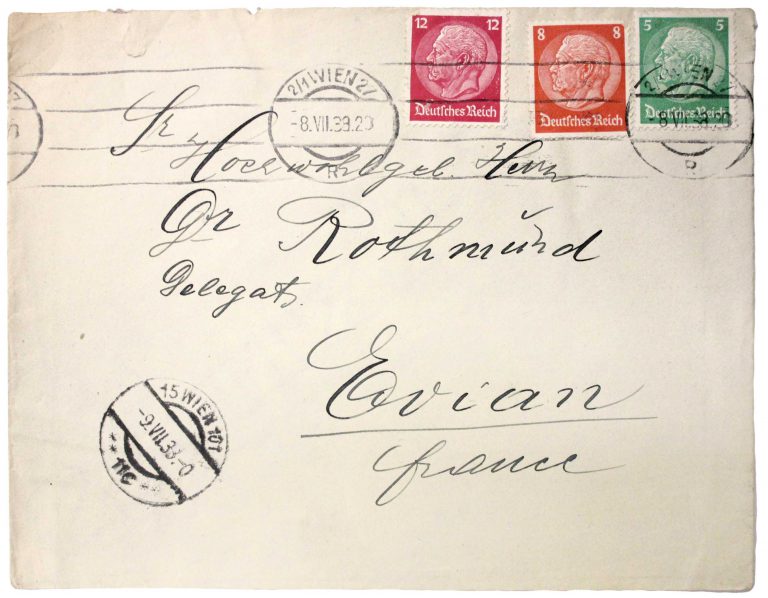
Envelope of letter to Heinrich Rothmund from Vienna, July 8–9, 1938
In a file labeled “Évian,” the chief of the Swiss aliens’ police forwards letters to his employee Henri Werner for his response. Some of the letters appeal against admitting any more Jewish refugees into the country; others beg that the Jews be let in.
Schweizerisches Bundesarchiv, Bern, E4800.1#1000867#72
Envelope of letter to Heinrich Rothmund from Vienna, July 8–9, 1938
In a file labeled “Évian,” the chief of the Swiss aliens’ police forwards letters to his employee Henri Werner for his response. Some of the letters appeal against admitting any more Jewish refugees into the country; others beg that the Jews be let in.
Schweizerisches Bundesarchiv, Bern, E4800.1#1000867#72
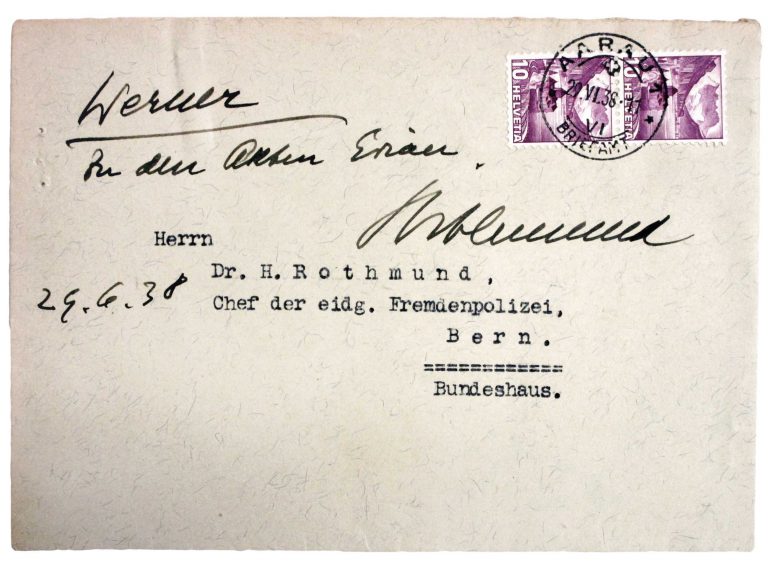
Envelope of letter to Heinrich Rothmund from Aarau, June 29, 1938
In a file labeled “Évian,” the chief of the Swiss aliens’ police forwards letters to his employee Henri Werner for his response. Some of the letters appeal against admitting any more Jewish refugees into the country; others beg that the Jews be let in.
Schweizerisches Bundesarchiv, Bern, E4300B#1000844#90
Envelope of letter to Heinrich Rothmund from Aarau, June 29, 1938
In a file labeled “Évian,” the chief of the Swiss aliens’ police forwards letters to his employee Henri Werner for his response. Some of the letters appeal against admitting any more Jewish refugees into the country; others beg that the Jews be let in.
Schweizerisches Bundesarchiv, Bern, E4300B#1000844#90
(William) Henri Werner
* 23 February 1908 Genf † 5 December 1985 Thônex
Henri Werner, the son of a law professor, begins pursuing his own law degree in Geneva in 1926 and spends his final semester from 1929 to 1930 as an exchange student in the United States. Afterwards, he settles in Geneva as a lawyer, where he passes the bar exam in 1933 shortly before defending his doctoral dissertation on international law.
In autumn 1934, he serves as secretary of the Belgium-Luxembourg Mediation Commission. In spring 1935, he joins the Swiss Department of Justice and Police. There, in late 1936, he is placed in charge of relations between the Swiss aliens’ police and international refugee aid organizations. In that role, he and Heinrich Rothmund take part in the refugee conference in Évian.
In 1939, he is temporarily exempted from military service as an officer of the court. Henri Werner leaves National Service in spring 1947 and returns to his home canton of Geneva to work as an attorney.
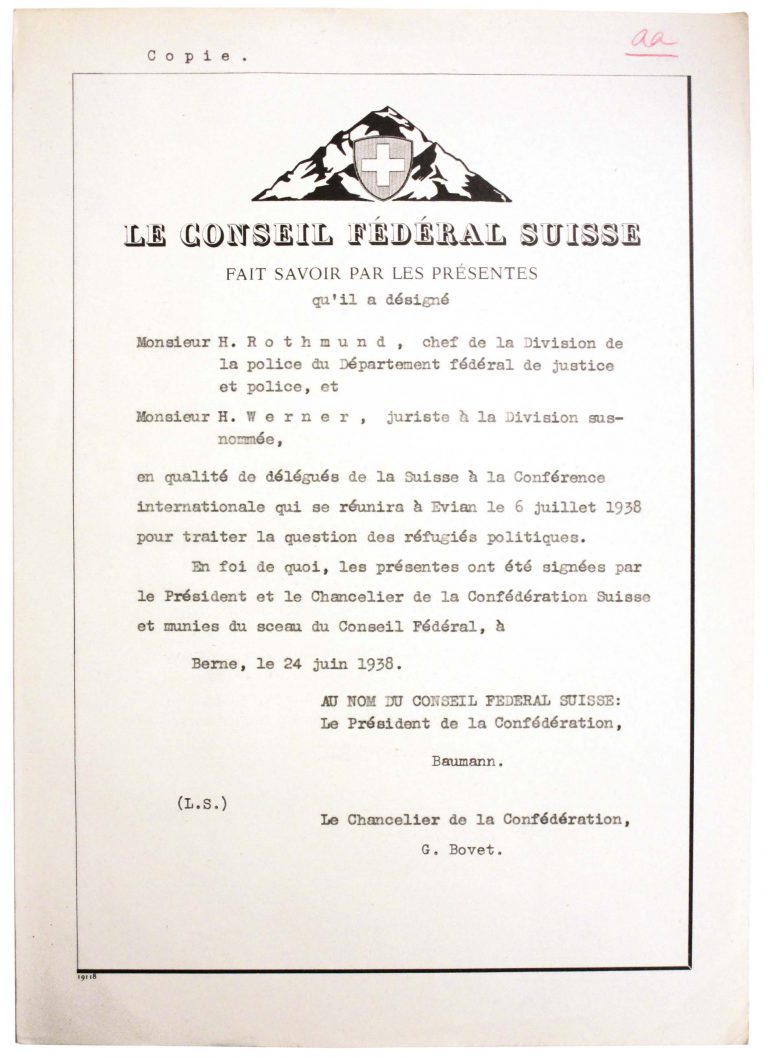
Swiss Federal Council: Letter of appointment for Heinrich Rothmund and Henri Werner, June 24, 1938
Schweizerisches Bundesarchiv, Bern, E2001D#10001553#5760
Swiss Federal Council: Letter of appointment for Heinrich Rothmund and Henri Werner, June 24, 1938
Schweizerisches Bundesarchiv, Bern, E2001D#10001553#5760
Conference Contributions
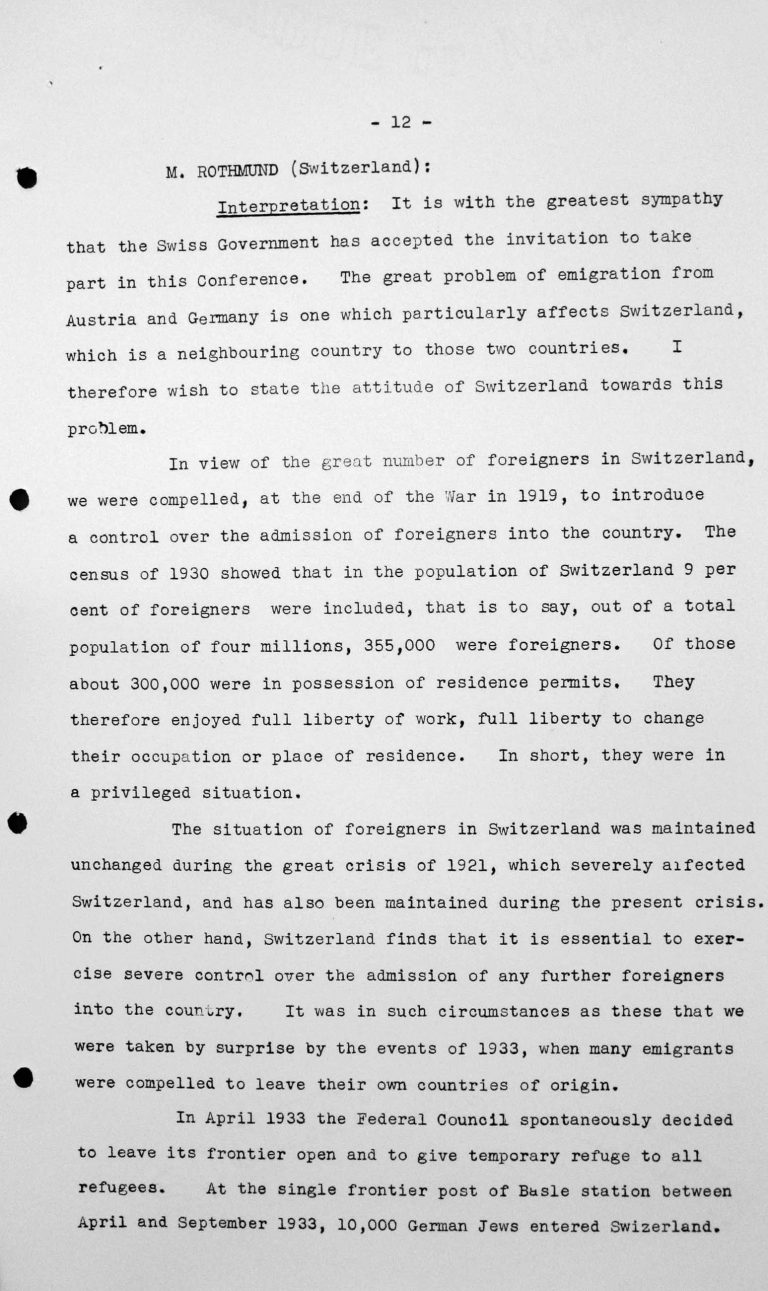
Statement by Heinrich Rothmund (Switzerland) in the public session on July 11, 1938, 11am, p. 1/5
Franklin D. Roosevelt Library, Hyde Park, NY
Statement by Heinrich Rothmund (Switzerland) in the public session on July 11, 1938, 11am, p. 1/5
Franklin D. Roosevelt Library, Hyde Park, NY
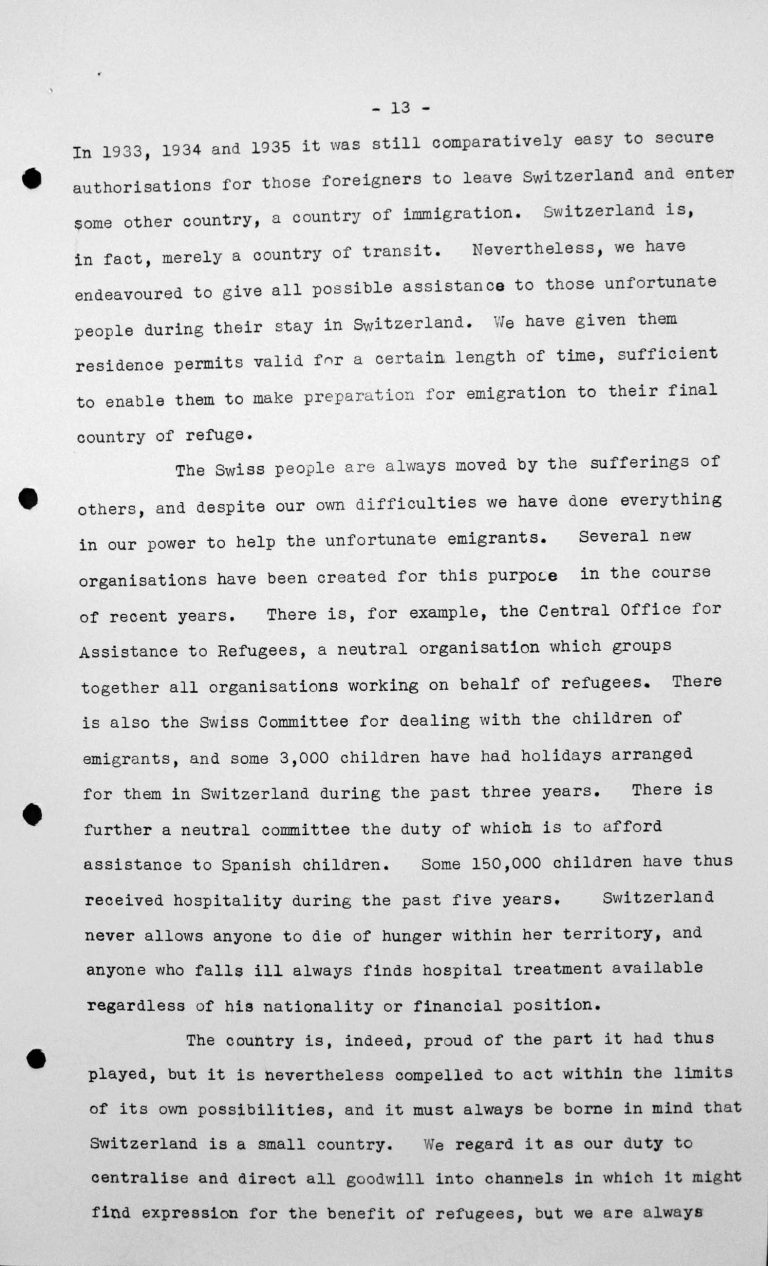
Statement by Heinrich Rothmund (Switzerland) in the public session on July 11, 1938, 11am, p. 2/5
Franklin D. Roosevelt Library, Hyde Park, NY
Statement by Heinrich Rothmund (Switzerland) in the public session on July 11, 1938, 11am, p. 2/5
Franklin D. Roosevelt Library, Hyde Park, NY
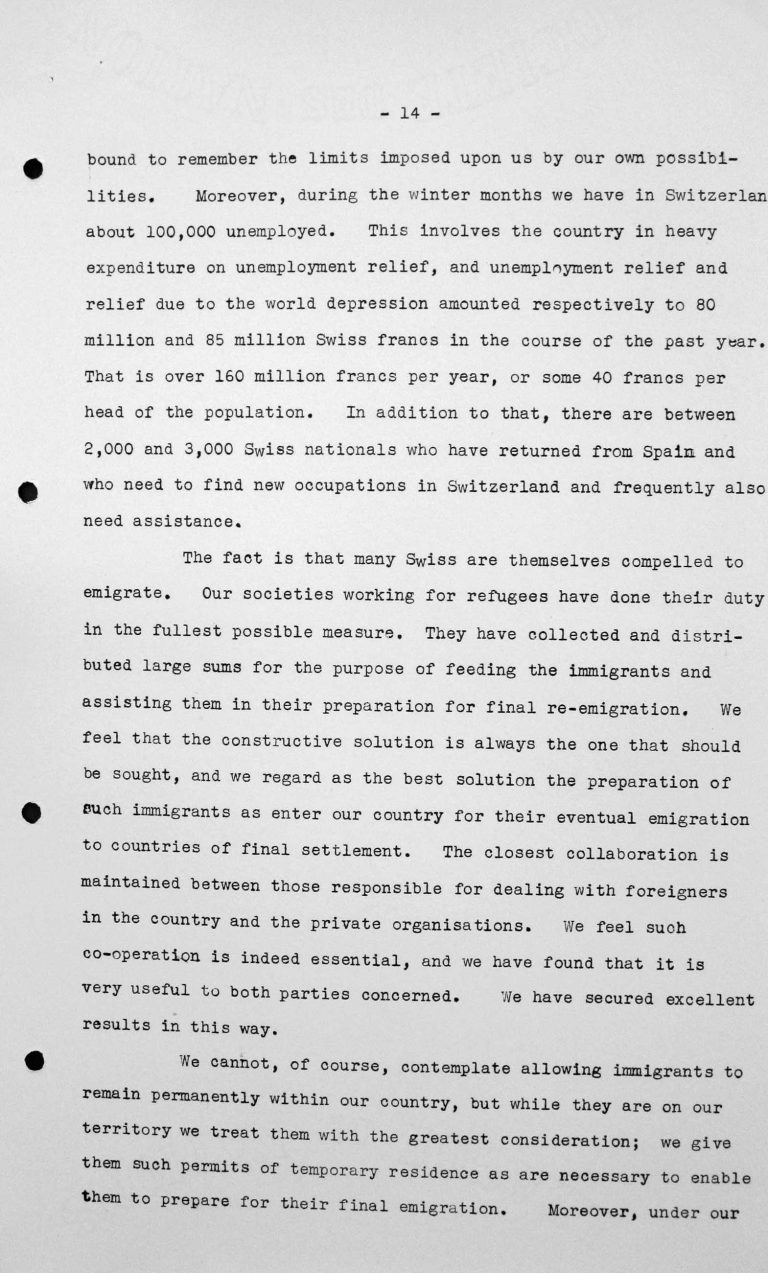
Statement by Heinrich Rothmund (Switzerland) in the public session on July 11, 1938, 11am, p. 3/5
Franklin D. Roosevelt Library, Hyde Park, NY
Statement by Heinrich Rothmund (Switzerland) in the public session on July 11, 1938, 11am, p. 3/5
Franklin D. Roosevelt Library, Hyde Park, NY
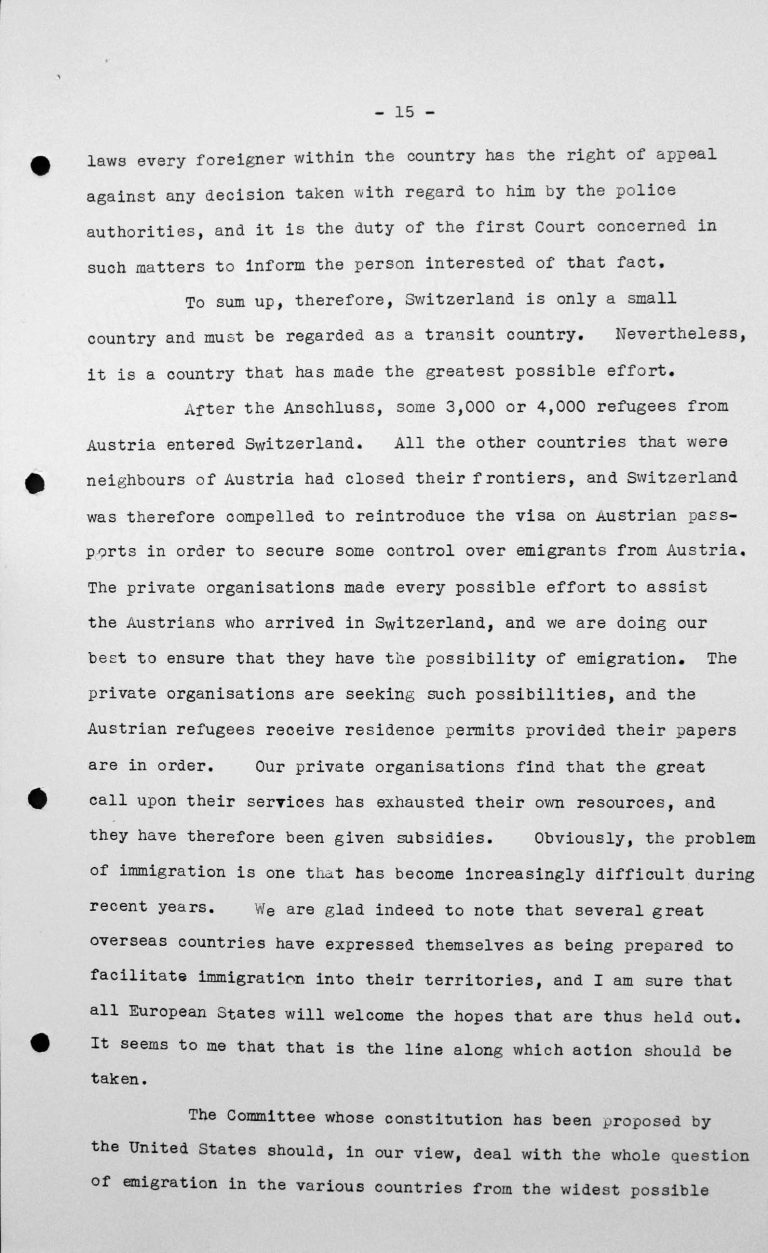
Statement by Heinrich Rothmund (Switzerland) in the public session on July 11, 1938, 11am, p. 4/5
Franklin D. Roosevelt Library, Hyde Park, NY
Statement by Heinrich Rothmund (Switzerland) in the public session on July 11, 1938, 11am, p. 4/5
Franklin D. Roosevelt Library, Hyde Park, NY
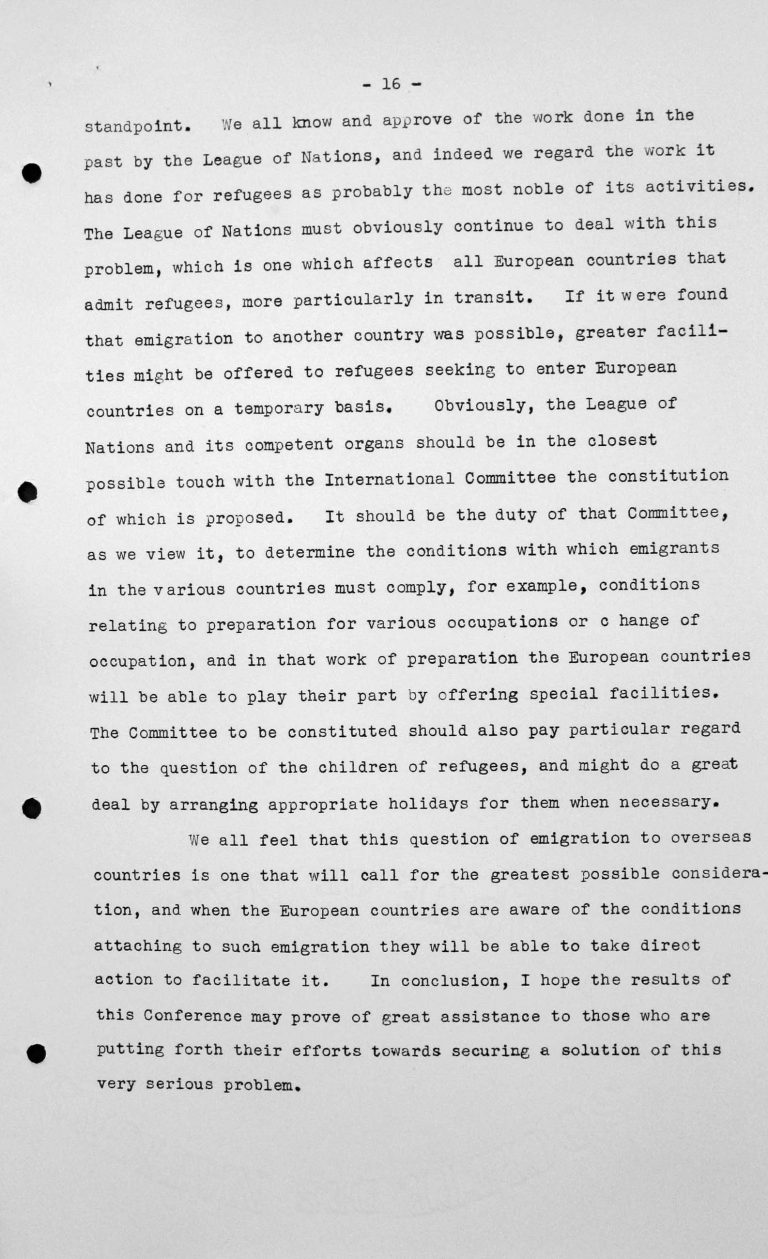
Statement by Heinrich Rothmund (Switzerland) in the public session on July 11, 1938, 11am, p. 5/5
Franklin D. Roosevelt Library, Hyde Park, NY
Statement by Heinrich Rothmund (Switzerland) in the public session on July 11, 1938, 11am, p. 5/5
Franklin D. Roosevelt Library, Hyde Park, NY
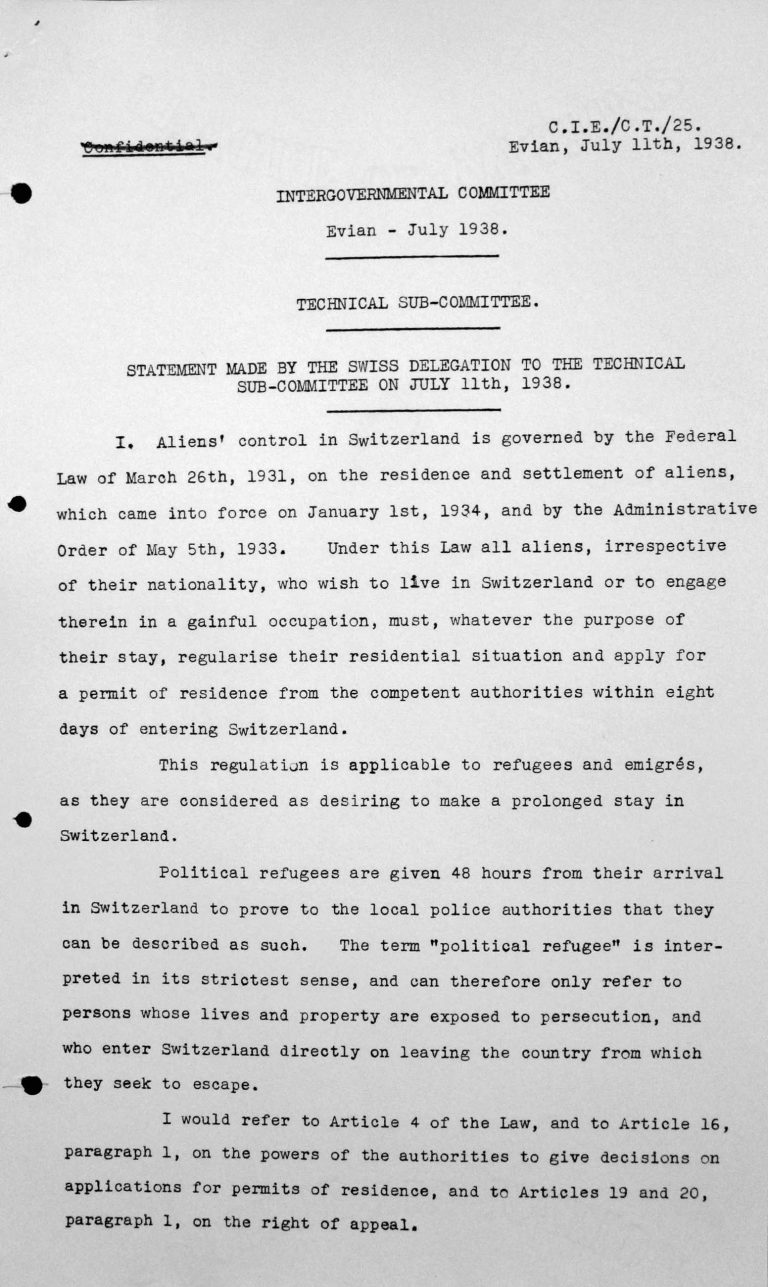
Statement made by the Swiss delegation to the Technical Sub-Committee, July 11, 1938, p. 1/2
Franklin D. Roosevelt Library, Hyde Park, NY
Statement made by the Swiss delegation to the Technical Sub-Committee, July 11, 1938, p. 1/2
Franklin D. Roosevelt Library, Hyde Park, NY
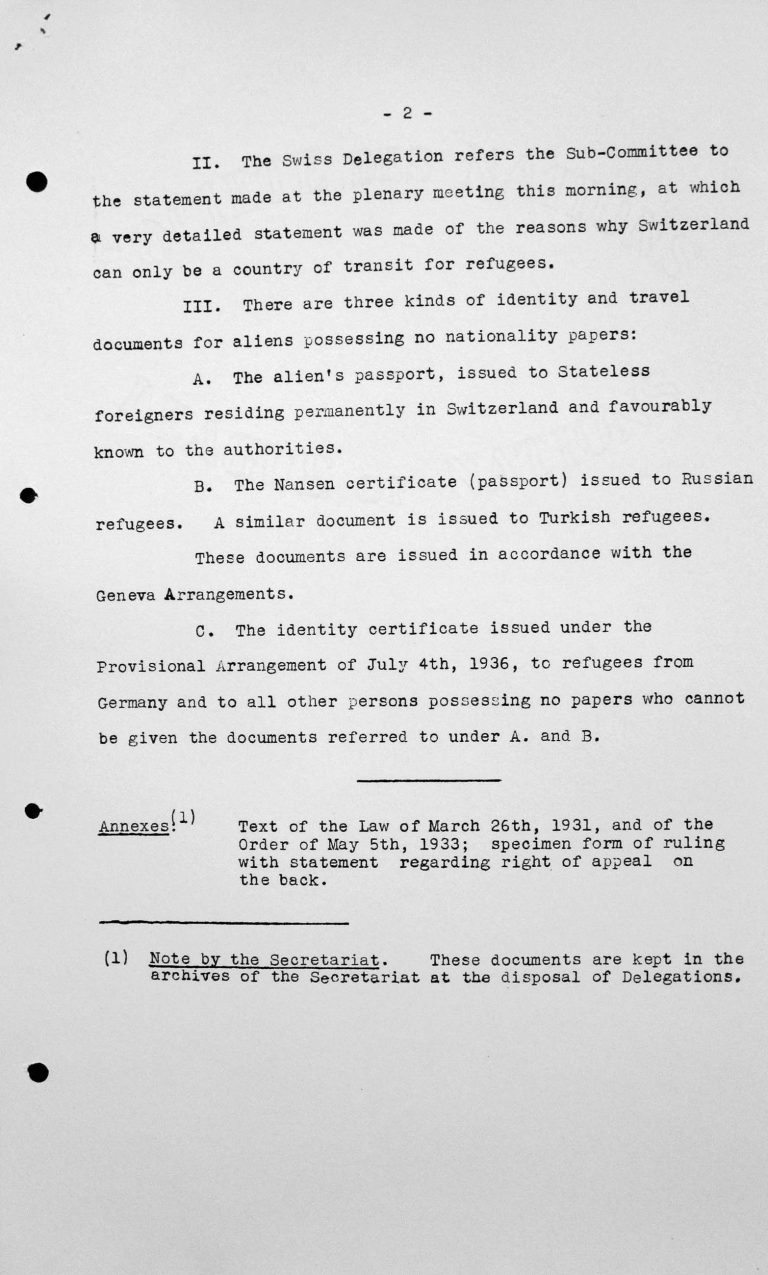
Statement made by the Swiss delegation to the Technical Sub-Committee, July 11, 1938, p. 2/2
Franklin D. Roosevelt Library, Hyde Park, NY
Statement made by the Swiss delegation to the Technical Sub-Committee, July 11, 1938, p. 2/2
Franklin D. Roosevelt Library, Hyde Park, NY
